- Affiliate Program

- UNITED STATES
- 台灣 (TAIWAN)
- TÜRKIYE (TURKEY)
- Academic Editing Services
- - Research Paper
- - Journal Manuscript
- - Dissertation
- - College & University Assignments
- Admissions Editing Services
- - Application Essay
- - Personal Statement
- - Recommendation Letter
- - Cover Letter
- - CV/Resume
- Business Editing Services
- - Business Documents
- - Report & Brochure
- - Website & Blog
- Writer Editing Services
- - Script & Screenplay
- Our Editors
- Client Reviews
- Editing & Proofreading Prices
- Wordvice Points
- Partner Discount
- Plagiarism Checker
- APA Citation Generator
- MLA Citation Generator
- Chicago Citation Generator
- Vancouver Citation Generator
- - APA Style
- - MLA Style
- - Chicago Style
- - Vancouver Style
- Writing & Editing Guide
- Academic Resources
- Admissions Resources

Academic CV (Curriculum Vitae) for Research: CV Examples
What is an academic CV (or research CV)?
An academic CV or “curriculum vitae” is a full synopsis (usually around two to three pages) of your educational and academic background. In addition to college and university transcripts, the personal statement or statement of purpose , and the cover letter, postgraduate candidates need to submit an academic CV when applying for research, teaching, and other faculty positions at universities and research institutions.
Writing an academic CV (also referred to as a “research CV” or “academic resume”) is a bit different than writing a professional resume. It focuses on your academic experience and qualifications for the position—although relevant work experience can still be included if the position calls for it.
What’s the difference between a CV and a resume?
While both CVs and resumes summarize your major activities and achievements, a resume is more heavily focused on professional achievements and work history. An academic CV, on the other hand, highlights academic accomplishments and summarizes your educational experience, academic background and related information.
Think of a CV as basically a longer and more academic version of a resume. It details your academic history, research interests, relevant work experience, publications, honors/awards, accomplishments, etc. For grad schools, the CV is a quick indicator of how extensive your background is in the field and how much academic potential you have. Ultimately, grad schools use your academic resume to gauge how successful you’re likely to be as a grad student.
Do I need an academic CV for graduate school?
Like personal statements, CVs are a common grad school application document (though not all programs require them). An academic CV serves the same basic purpose as a regular CV: to secure you the job you want—in this case, the position of “grad student.” Essentially, the CV is a sales pitch to grad schools, and you’re selling yourself !
In addition to your college transcripts, GRE scores, and personal statement or statement of purpose , graduate schools often require applicants submit an academic CV. The rules for composing a CV for a Master’s or doctoral application are slightly different than those for a standard job application. Let’s take a closer look.
Academic CV Format Guidelines
No matter how compelling the content of your CV might be, it must still be clear and easy for graduate admissions committee members to understand. Keep these formatting and organization tips in mind when composing and revising your CV:
- Whatever formatting choices you make (e.g., indentation, font and text size, spacing, grammar), keep it consistent throughout the document.
- Use bolding, italics, underlining, and capitalized words to highlight key information.
- Use reverse chronological order to list your experiences within the sections.
- Include the most important information to the top and left of each entry and place associated dates to the right.
- Include page numbers on each page followed by your last name as a header or footer.
- Use academic verbs and terms in bulleted lists; vary your language and do not repeat the same terms. (See our list of best verbs for CVs and resumes )
How long should a CV be?
While resumes should be concise and are usually limited to one or two pages, an academic CV isn’t restricted by word count or number of pages. Because academic CVs are submitted for careers in research and academia, they have all of the sections and content of a professional CV, but they also require additional information about publications, grants, teaching positions, research, conferences, etc.
It is difficult to shorten the length without shortening the number of CV sections you include. Because the scope and depth of candidates’ academic careers vary greatly, academic CVs that are as short as two pages or as long as five pages will likely not surprise graduate admissions faculty.
How to Write an Academic CV
Before we look at academic CV examples, let’s discuss the main sections of the CV and how you can go about writing your CV from scratch. Take a look at the sections of the academic CV and read about which information to include and where to put each CV section. For academic CV examples, see the section that follows this one.
Academic CV Sections to Include (with Examples)
A strong academic CV should include the following sections, starting from the top of the list and moving through the bottom. This is the basic Academic CV structure, but some of the subsections (such as research publications and academic awards) can be rearranged to highlight your specific strengths and achievements.
- Contact Information
- Research Objective or Personal Profile
- Education Section
- Professional Appointments
- Research Publications
- Awards and Honors
- Grants and Fellowships
- Conferences Attended
- Teaching Experience
- Research Experience
- Additional Activities
- Languages and Skills
Now let’s go through each section of your academic CV to see what information to include in detail.
1. Contact Information
Your academic curriculum vitae must include your full contact information, including the following:
- Professional title and affiliation (if applicable)
- Institutional address (if you are currently registered as a student)
- Your home address
- Your email address
- Your telephone number
- LinkedIn profile or other professional profile links (if applicable)
In more business-related fields or industries, adding your LinkedIn profile in your contact information section is recommended to give reviewers a more holistic understanding of your academic and professional profile.
Check out our article on how to use your LinkedIn profile to attract employers .
2. Research Objective or Personal Profile
A research objective for an academic CV is a concise paragraph (or long sentence) detailing your specific research plans and goals.
A personal profile gives summarizes your academic background and crowning achievements.
Should you choose a research objective or a personal profile?
If you are writing a research CV, include a research objective. For example, indicate that you are applying to graduate research programs or seeking research grants for your project or study
A research objective will catch the graduate admission committee’s attention and make them want to take a closer look at you as a candidate.
Academic CV research objective example for PhD application
MA student in Sociology and Gender Studies at North American University who made the President’s List for for six consecutive semesters seeking to use a semester-long research internship to enter into postgraduate research on the Impetus for Religious In-groups in Eastern Europe in the Twentieth Century.
Note that the candidate includes details about their academic field, their specific scholastic achievements (including an internship), and a specific topic of study. This level of detail shows graduate committees that you are a candidate who is fully prepared for the rigors of grad school life.
While an academic CV research objective encapsulates your research objective, a CV personal profile should summarize your personal statement or grad school statement of purpose .
Academic CV personal profile example for a post-doctoral university position
Proven excellence in the development of a strong rapport with undergraduate students, colleagues, and administrators as a lecturer at a major research university. Exhibits expertise in the creation and implementation of lifelong learning programs and the personalized development of strategies and activities to propel learning in Higher Education, specifically in the field of Education. Experienced lecturer, inspirational tutor, and focused researcher with a knack for recognizing and encouraging growth in individuals. Has completed a Master’s and PhD in Sociology and Education with a BA in Educational Administration.
What makes this CV personal profile example so compelling? Again, the details included about the applicant’s academic history and achievements make the reader take note and provide concrete examples of success, proving the candidate’s academic acumen and verifiable achievements.
3. Education Section
If you are applying to an academic position, the Education section is the most essential part of your academic CV.
List your postsecondary degrees in reverse chronological order . Begin with your most recent education (whether or not you have received a degree at the time of application), follow it with your previous education/degree, and then list the ones before these.
Include the following educational details:
- Year of completion or expected completion (do not include starting dates)
- Type of Degree
- Any minor degrees (if applicable)
- Your department and institution
- Your honors and awards
- Dissertation/Thesis Title and Advisor (if applicable)
Because this is arguably the most important academic CV section, make sure that all of the information is completely accurate and that you have not left out any details that highlight your skills as a student.
4. Professional Appointments
Following the education section, list your employment/professional positions on your academic CV. These should be positions related to academia rather than previous jobs or positions you held in the private section (whether it be a chef or a CEO). These appointments are typically tenure-track positions, not ad hoc and adjunct professor gigs, nor TA (teacher assistant) experience. You should instead label this kind of experience under “Teaching Experience,” which we discuss further down the list.
List the following information for each entry in your “Professional Appointments” section:
- Institution (university/college name)
- Department
- Your professional title
- Dates employed (include beginning and end dates)
- Duties in this position
5. Research Publications
Divide your publications into two distinct sections: peer-reviewed publications and other publications. List peer-reviewed publications first, as these tend to carry more weight in academia. Use a subheading to distinguish these sections for the reader and make your CV details easier to understand.
Within each subsection, further divide your publications in the following order:
- Book chapters
- Peer-reviewed journal articles
- Contributions to edited volumes equivalent to peer-reviewed journals
All of your other research publications should be put into a subcategory titled “Other Publications.” This includes all documents published by a third party that did not receive peer review, whether it is an academic journal, a science magazine, a website, or any other publishing platform.
Tip: When listing your publications, choose one academic formatting style ( MLA style , Chicago style , APA style , etc.) and apply it throughout your academic CV. Unsure which formatting style to use? Check the website of the school you are applying to and see what citation style they use.
6. Awards and Honors
This section allows you to show off how your skills and achievements were officially acknowledged. List all academic honors and awards you have received in reverse chronological order, just like the education and professional appointments sections. Include the name of the award, which year you received it, and the institution that awarded it to you.
Should you include how much money you were awarded? While this is not recommended for most academic fields (including humanities and social sciences), it is more common for business or STEM fields.
7. Fellowships and Grants
It is important to include fellowships and grants you received because it evidences that your research has been novel and valuable enough to attract funding from institutions or third parties.
Just like with awards and honors, list your grants and fellowships in reverse chronological order. Enter the years your fellowship or grant spanned and the name of the institution or entity providing the funding. Whether you disclose the specific dollar amount of funding you received depends on your field of study, just as with awards and honors.
8. Conferences Attended
Involvement in academic conferences shows admissions committees that you are already an active member of the research community. List the academic conferences in which you took part and divide this section into three subsections:
- Invited talks —conferences you presented at other institutions to which you received an invitation
- Campus talks —lectures you gave on your own institution’s campus
- Conference participation —conferences you participated in (attended) but gave no lecture
9. Teaching Experience
The “Teaching Experience” section is distinct from the “Professional Appointments” section discussed above. In the Teaching Experience CV section, list any courses you taught as a TA (teacher’s assistant) you have taught. If you taught fewer than ten courses, list all of them out. Included the name of the institution, your department, your specific teaching role, and the dates you taught in this position.
If you have a long tenure as an academic scholar and your academic CV Appointments section strongly highlights your strengths and achievements, in the Teaching Experience sections you could list only the institutions at which you were a TA. Since it is likely that you will be teaching, lecturing, or mentoring undergraduates and other research students in your postgraduate role, this section is helpful in making you stand out from other graduate, doctoral, or postdoctoral candidates.
10. Research Experience
In the “Research Experience” section of your CV, list all of the academic research posts at which you served. As with the other CV sections, enter these positions in reverse chronological order.
If you have significant experience (and your academic CV is filling up), you might want to limit research and lab positions to only the most pertinent to the research position to which you are applying. Include the following research positions:
- Full-time Researcher
- Research Associate
- Research Assistant
For an academic or research CV, if you do not have much research experience, include all research projects in which you participated–even the research projects with the smallest roles, budget, length, or scope.
11. Additional Activities
If you have any other activities, distinctions, positions, etc. that do not fit into the above academic CV sections, include them here.
The following items might fit in the “Additional Activities” section:
- Extracurriculars (clubs, societies, sports teams, etc.)
- Jobs unrelated to your academic career
- Service to profession
- Media coverage
- Volunteer work
12. Languages and Skills
Many non-academic professional job positions require unique skillsets to succeed. The same can be true with academic and research positions at universities, especially when you speak a language that might come in handy with the specific area of study or with the other researchers you are likely to be working alongside.
Include all the languages in which you are proficient enough to read and understand academic texts. Qualify your proficiency level with the following terms and phrases:
- IntermediateNative/bilingual in Language
- Can read Language with a dictionary
- Advanced use of Language
- Fully proficient in Language
- Native fluency in Language
- Native/Bilingual Language speaker
If you only have a basic comprehension of a language (or if you simply minored in it a decade ago but never really used it), omit these from this section.
Including skills on an academic CV is optional and MIGHT appear somewhat amateur if it is not a skill that is difficult and would likely contribute to your competency in your research position. In general, include a skill only if you are in a scientific or technical field (STEM fields) and if they realistically make you a better candidate.
13. References
The final section of your academic CV is the “References” section. Only include references from individuals who know you well and have first-hand experience working with you, either in the capacity of a manager, instructor, or professor, or as a colleague who can attest to your character and how well you worked in that position. Avoid using personal references and never use family members or acquaintances–unless they can somehow attest to your strength as an academic.
List your references in the order of their importance or ability to back up your candidacy. In other words, list the referrers you would want the admissions faculty to contact first and who would give you a shining review.
Include the following in this order:
- Full name and academic title
- Physical mailing address
- Telephone number
- Email address
Academic CV Examples by Section
Now that you have a template for what to include in your academic CV sections, let’s look at some examples of academic CV sections with actual applicant information included. Remember that the best CVs are those that clearly state the applicant’s qualifications, skills, and achievements. Let’s go through the CV section-by-section to see how best to highlight these elements of your academic profile. Note that although this example CV does not include EVERY section detailed above, this doesn’t mean that YOU shouldn’t include any of those sections if you have the experiences to fill them in.
CV Example: Personal Details (Basic)
Write your full name, home address, phone number, and email address. Include this information at the top of the first page, either in the center of the page or aligned left.
- Tip: Use a larger font size and put the text in bold to make this info stand out.
CV Example: Profile Summary (Optional)
This applicant uses an academic research profile summary that outlines their personal details and describes core qualifications and interests in a specific research topic. Remember that the aim of this section is to entice admissions officials into reading through your entire CV.
- Tip: Include only skills, experience, and what most drives you in your academic and career goals.
CV Example: Education Section (Basic)
This applicant’s academic degrees are listed in reverse chronological order, starting with those that are currently in progress and recently completed and moving backward in time to their undergraduate degrees and institutions.
- Include the name of the institution; city, state, and country (if different from the institution to which you are applying); degree type and major; and month/year the degree was or will be awarded.
- Provide details such as the title of your thesis/dissertation and your advisor, if applicable.
- Tip: Provide more details about more recent degrees and fewer details for older degrees.
CV Example: Relevant Experience (Basic)
List professional positions that highlight your skills and qualifications. When including details about non-academic jobs you have held, be sure that they relate to your academic career in some way. Group experiences into relevant categories if you have multiple elements to include in one category (e.g., “Research,” “Teaching,” and “Managerial”). For each position, be sure to:
- Include position title; the name of organization or company; city, state, and country (if different from the institution to which you are applying); and dates you held the position
- Use bullet points for each relevant duty/activity and accomplishment
- Tip: For bulleted content, use strong CV words , vary your vocabulary, and write in the active voice; lead with the verbs and write in phrases rather than in complete sentences.
CV Example: Special Qualifications or Skills (Optional)
Summarize skills and strengths relevant to the position and/or area of study if they are relevant and important to your academic discipline. Remember that you should not include any skills that are not central to the competencies of the position, as these can make you appear unprofessional.
CV Example: Publications (Basic)
Include a chronological (not alphabetical) list of any books, journal articles, chapters, research reports, pamphlets, or any other publication you have authored or co-authored. This sample CV does not segment the publications by “peer-reviewed” and “non-peer-reviewed,” but this could simply be because they do not have many publications to list. Keep in mind that your CV format and overall design and readability are also important factors in creating a strong curriculum vitae, so you might opt for a more streamlined layout if needed.
- Use bibliographic citations for each work in the format appropriate for your particular field of study.
- Tip: If you have not officially authored or co-authored any text publications, include studies you assisted in or any online articles you have written or contributed to that are related to your discipline or that are academic in nature. Including any relevant work in this section shows the faculty members that you are interested in your field of study, even if you haven’t had an opportunity to publish work yet.
CV Example: Conferences Attended (Basic)
Include any presentations you have been involved in, whether you were the presenter or contributed to the visual work (such as posters and slides), or simply attended as an invitee. See the CV template guide in the first section of this article for how to list conference participation for more seasoned researchers.
- Give the title of the presentation, the name of the conference or event, and the location and date.
- Briefly describe the content of your presentation.
- Tip: Use style formatting appropriate to your field of study to cite the conference (APA, MLA, Chicago, etc.)
CV Example: Honors and Awards (Basic)
Honors and awards can include anything from university scholarships and grants, to teaching assistantships and fellowships, to inclusion on the Dean’s list for having a stellar GPA. As with other sections, use your discretion and choose the achievements that best highlight you as a candidate for the academic position.
- Include the names of the honors and official recognition and the date that you received them.
- Tip: Place these in order of importance, not necessarily in chronological order.
CV Example: Professional/Institutional Service (Optional)
List the professional and institutional offices you have held, student groups you have led or managed, committees you have been involved with, or extra academic projects you have participated in.
- Tip: Showing your involvement in campus life, however minor, can greatly strengthen your CV. It shows the graduate faculty that you not only contribute to the academic integrity of the institution but that you also enrich the life of the campus and community.
CV Example: Certifications and Professional Associations (Optional)
Include any membership in professional organizations (national, state, or local). This can include nominal participation as a student, not only as a professional member.
CV Example: Community Involvement and Volunteer Work (Optional)
Include any volunteer work or outreach to community organizations, including work with churches, schools, shelters, non-profits, and other service organizations. As with institutional service, showing community involvement demonstrates your integrity and willingness to go the extra mile—a very important quality in a postgraduate student or faculty member.
While the CV template guide above suggests including these activities in a section titled “Additional Activities,” if you have several instances of volunteer work or other community involvement, creating a separate heading will help catch the eye of the admissions reviewer.
CV Example: References Section (Basic)
References are usually listed in the final section of an academic CV. Include 3-5 professional or academic references who can vouch for your ability and qualifications and provide evidence of these characteristics.
- Write the name of the reference, professional title, affiliation, and contact information (phone and email are sufficient). You do not need to write these in alphabetical order. Consider listing your references in order of relevance and impact.
CV Editing for Research Positions
After you finish drafting and revising your academic CV, you still need to ensure that your language is clear, compelling, and accurate and that it doesn’t have any errors in grammar, spelling, or punctuation.
A good academic CV typically goes through at least three or four rounds of revision before it is ready to send out to university department faculty. Be sure to have a peer or CV editing service check your CV or academic resume, and get cover letter editing and application essay editing for your longer admissions documents to ensure that there are no glaring errors or major room for improvement.
For professional editing services that are among the highest quality in the industry, send your CV and other application documents to Wordvice’s admissions editing services . Our professional proofreaders and editors will ensure that your hard work is reflected in your CV and help make your postgrad goals a reality.
Check out our full suite of professional proofreading and English editing services on the Wordvice homepage.

Press Enter to search
How to List Research Experience on Your Resume
Applying for a role that requires research skills? Here’s how to list your research experience on a resume, with examples you can follow.
3 years ago • 7 min read
Research experience isn’t just for science and academia. Research is a valuable skill that’s required for a number of roles and industries, which means it almost certainly has a place on your resume. And no — that doesn’t mean writing “research” in your skills section and moving on.
Why you should list research experience on your resume
If you’re applying for a job that involves research, listing research experience is a no-brainer. Research-specific positions, scientific jobs like Research Assistants , Lab Assistants or Technicians, graduate school applications, and most jobs in academia all require evidence of research skills. Even outside these positions, research experience demonstrates valuable transferable skills, like critical thinking and attention to detail . Which is not to say that you need to include research experience on every resume — if it makes you a stronger candidate, include it, but if it isn’t relevant and doesn’t add anything else to your candidacy, leave it off.
Research experience resume example
Before we dive right in, here's a sample resume that emphasizes research skills. You can use this as a template or as inspiration to write your own resume from scratch.

Download: PDF | Google Docs
How to list research experience in your resume
Like a lot of desirable skills, research is a soft skill , meaning it’s not something you can claim as an objective fact on your resume without backing it up. What you can do instead is prove it — what previous role involved a lot of research? What resume accomplishments do you have that highlight your research experience? Showing how you used research skills in action is the best way to demonstrate the value you could bring to the company and role you’re applying for.
There are a number of ways you can highlight research experience on your resume:
In a dedicated section
In your work experience, in your education section, listing research publications, in a projects section, in your skills section, in your resume summary.
Let's take a look at each of these options in a little more depth. But first, let's look at an annotated example to help set the context.
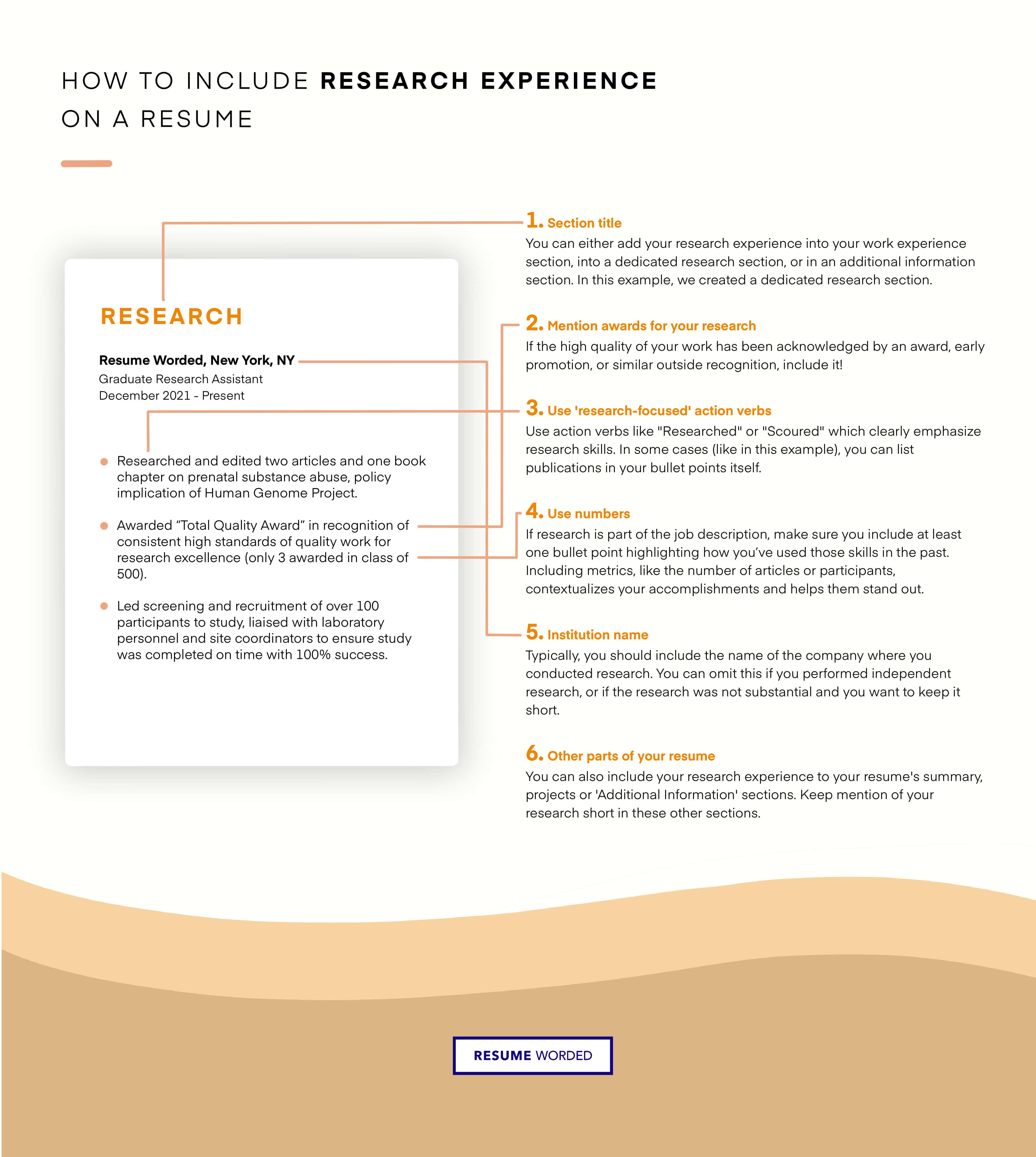
If you come from a research background, you might want to title your work experience ‘Research.’ Alternatively, you could create two experience sections — one titled ‘Work Experience’ and one titled ‘Research Experience’ — if you also have a lot of non-research experience but want to highlight your most relevant experience first. You can go into more detail when applying for a research-focused role by describing the project and specifying the nature of the research and your role in it.
More information: How to title different sections of your resume
Including research experience in your main work experience section is appropriate if it was paid work or if it was your most recent and relevant experience. List the employer — for example, the university or research department — job title, dates, and accomplishments, just like you would any other work experience.
More information: How to list your work experience on your resume
If you’re a current student or recent graduate, you can list your education section at the top of your resume. You can also make this section a little more comprehensive if you don’t have a lot of work experience, by including things like awards, coursework, and academic research.
If you undertook research as part of your studies and it demonstrates skills relevant to the job you’re applying for, list your research accomplishments in bullet points under the education section of your resume.
More information: The must-haves when writing your education on your resume
If you have a lot of publications that came out of your research, and you want to draw attention to them — and if they’re relevant to the job you’re applying for — consider creating a separate publications section . Formal publications like these are an excellent way to add credibility to your research experience.
List each publication in a new bullet point with the title, year, and name of the magazine, website, or journal. Academic publications can be listed more formally if it’s relevant, like if you’re applying for graduate school or a role in academia.
When it comes to listing research on your resume, like other soft skills, you need to show you’ve used this skill in your previous roles by showcasing your research related accomplishments. Upload your resume to the tool below to find out if your resume highlights your most relevant research experience and achievements.
If your research experience is less extensive or wasn’t quite relevant enough to include alongside your work experience or education, you can still highlight it in a projects section. Keep this brief and include 1-2 bullet points showcasing your key research accomplishments.
More information: How to list projects on a resume
Research skills can go in your skills section — as long as they’re hard skills. Steer clear of listing generic skills like “Research” — instead, use our keyword finder to look for relevant skills and keywords and include specific hard skills like data analysis, project management, software proficiency, and certifications.
You can also use the skills search tool below to get a list of hard skills relevant to the research-focused role you’re applying for.
More information: How to write a resume skills section
If you’re applying for a position where research experience is essential, consider emphasizing your experience by including a short resume summary at the top of your resume. This should include the title of the job you’re applying for and a brief overview of your background and key skills.
More information: Generate a summary for your resume
Examples of listing research experience on your resume
No matter where you choose to include it, always list research experience in concise, accomplishment-focused bullet points . These should follow the structure of action verb + what you did + what the result was. Here are some examples of resume bullet points you can use or modify to suit your own research experiences.
Highlight research projects
- Assisted with cell development research projects as part of the Leukemia Research team — identifying cell changes, determining cell counts and coulter counters with 98% accuracy.
If you have significant research experience, describe it! The more relevant it is to the position you’re applying for, the more detail you can go into. Make sure to specify exactly what stages of research you worked on and what your contribution was.
Mention awards for your research
- Awarded “Total Quality Award” in recognition of consistent high standards of quality work for research excellence (only 3 awarded in class of 500).
If the high quality of your work has been acknowledged by an award, early promotion , or similar outside recognition, include it! In addition to the name of the award or accolade, don’t forget to specify context (e.g. 'out of class of 500 people' to increase its credibility.
Demonstrate technical expertise
- Created over 75 3D models with CAD tools such as Solidworks and ANSYS.
If you have experience with specific software or tools that you’ll be using in the position you’re applying for, include a bullet point accomplishment specifying how you’ve used them. While this isn't direct 'research' experience, it uses tools that are relevant to research projects — this is a good way of showing that you have research skill sets without having formal research experience.
Use 'research-focused' action verbs
- Researched and edited two articles and one book chapter on prenatal substance abuse, policy implication of Human Genome Project.
Use action verbs like "Researched" or "Scoured" which clearly emphasize research skills. In some cases (like in this example), you can list publications in your bullet points itself. If you’ve authored academic papers, books, or articles, this is a great way to show the validity and importance of your research.
Include accomplishments related to research studies
- Oversaw screening and recruitment of over 100 participants to study, liaised with laboratory personnel and site coordinators to ensure study is completed on time with 100% success.
Not all research positions involve pure research. Make sure you highlight appropriate related accomplishments, like managing research study participant data and enrolments or managing a team of research assistants.
Include accomplishments relating to research in your field
- Conducted legal research; organized and analyzed data and evidence for over 50 cases annually.
If research is part of the job description, make sure you include at least one bullet point highlighting how you’ve used those skills in the past. Including metrics, like the number of cases you’ve researched, contextualizes your accomplishments and helps them stand out.
- Conducted marketing research for both buy-side and sell-side resulting in 15 strong leads.
Research isn’t just limited to science and academia. Demonstrate your skills in action by the context and end results of your research, like the number of leads it generated or the increase in sales figures.
Spread the word
Hiring manager’s guide: how to list work experience on your resume, you lied on your resume and got the job. what now, keep reading, how to show bilingualism on your resume (with examples), oops what to do if there’s a mistake on your resume, getting the basics right: resume line spacing, subscribe to our newsletter.
Stay updated with Resume Worded by signing up for our newsletter.
🎉 Awesome! Now check your inbox and click the link to confirm your subscription.
Please enter a valid email address
Oops! There was an error sending the email, please try later

Thank you for the checklist! I realized I was making so many mistakes on my resume that I've now fixed. I'm much more confident in my resume now.

Research Scientist CV example
Do you need a research scientist CV that helps you to build chemistry with recruiters?
Then we have a solution!
We can help you to create an application worthy of your white coat. Make the most of our top tips and research scientist CV example below to get you started.
CV templates
Research Scientist CV example
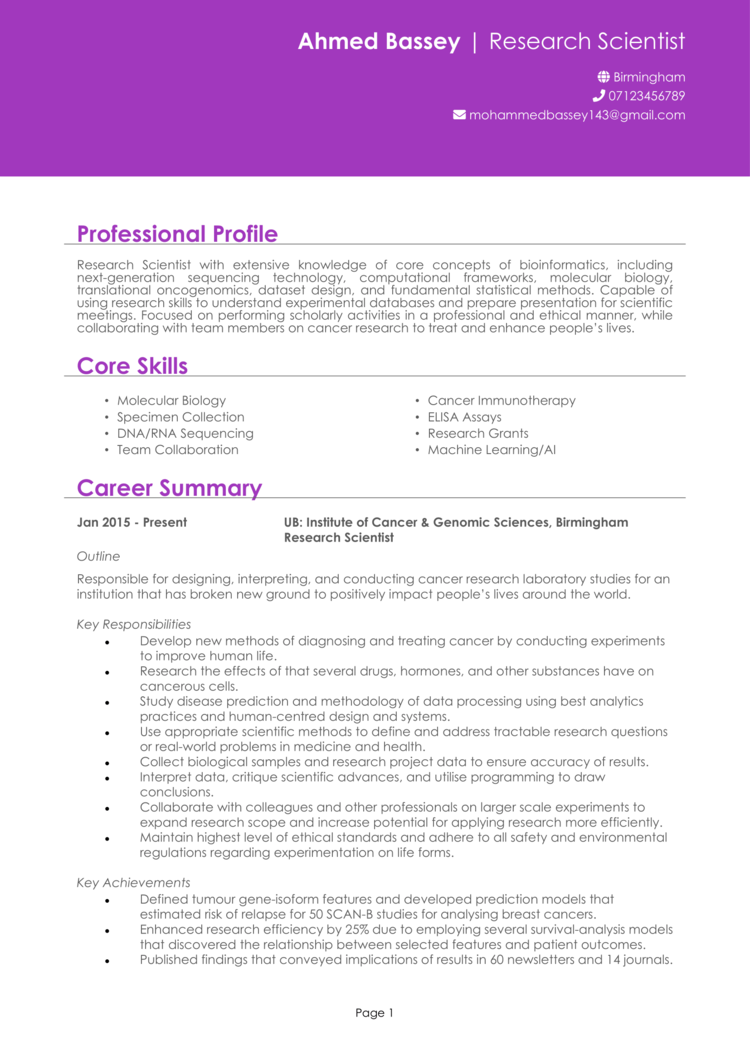
Before you start writing your CV, take a look at the example Research Scientist CV above to give yourself a good idea of the style and format that recruiters and hiring managers prefer to see.
Also, take note of the type of content that is included to impress recruiters, and how the most relevant information is made prominent, to ensure it gets noticed.

Build your CV now
Research Scientist CV layout and format
Your CV is the first impression you’ll make on anybody who reads it.
A disorganised, cluttered and barely-readable CV could seriously decrease your chances of landing interviews, so it’s essential to make sure yours is slick, professional and easy to navigate.
You can do this by using a clear structure and formatting your content with some savvy formatting techniques – check them out below:

CV formatting tips
- Length: Think that submitting a five page CV will impress recruiters? You’re wrong! Even if you’ve got tons of experience to brag about, recruiters don’t have time to read through overly detailed CVs. Keep it short, concise and relevant – a CV length of 2 sides of A4 pages or less is perfect.
- Readability : By clearly formatting your section headings (bold, or a different colour font, do the trick) and breaking up big chunks of text into snappy bullet points, time-strapped recruiters will be able to skim through your CV with ease.
- Design: Don’t waste time adding fancy designs to your CV. It generally adds no value to your application and may even end up distracting recruiters away from the important written content.
- Avoid photos: Don’t add photos, images or profile photos to your CV. Not only do they take up much-needed CV space, but they’re actually completely unnecessary and won’t boost your CV at all.
Quick tip: Formatting your CV to look professional can be difficult and time-consuming when using Microsoft Word or Google Docs. If you want to create an attractive CV quickly, try our quick-and-easy CV Builder and use one of their eye-catching professional CV templates.

CV structure
For easy reading, write your CV to the following CV structure:
- Contact details – Make it easy for recruiters to get in touch with you by listing your contact details at the top of your CV.
- Profile – A short and snappy summary of your experience and skills, showcasing what makes you a good fit for the position.
- Work experience / career history – Note down all your work history, with your current position first, then working backwards.
- Education – A short list of your academic background and professional/vocational qualifications.
- Interest and hobbies – This is an optional section, which you can use to highlight any relevant hobbies or interests.
Now I’ll tell you exactly what you should include in each CV section.

CV Contact Details

Tuck your contact details into the corner of your CV, so that they don’t take up too much space. Stick to the basic details, such as:
- Mobile number
- Email address – It should sound professional, such as your full name.
- Location -Just write your rough location, rather than your full address.
- LinkedIn profile or portfolio URL – If you include these, ensure they’re sleek, professional and up-to-date.
Research Scientist CV Profile
Recruiters and hiring managers are busy, so it’s essential to catch their attention from the get-go.
A strong introductory profile (or personal statement , for junior candidates) at the top of the CV is the first thing they’ll read, so it’s a great chance to make an impression.
It should be a short but punchy summary of your key skills, relevant experience and accomplishments.
Ultimately, it should explain why you’re a great fit for the role you’re applying for and inspire recruiters to read the rest of your CV.

Tips for creating an strong CV profile:
- Keep it concise: Aim for a short, snappy paragraph of 3-5 lines. This is just enough room to showcase why you’d make the perfect hire, without going into excessive detail and overwhelming busy recruiters.
- Tailor it: Recruiters can spot a generic, mass-produced CV at a glance – and they certainly won’t be impressed! Before you write your profile (and CV as a whole), read through the job advert and make a list of any skills, knowledge and experience required. You should then incorporate your findings throughout your profile and the rest of your CV.
- Don’t add an objective: Avoid discussing your career goals in your CV profile – if you think they’re necessary, briefly mention them in your cover letter instead.
- Avoid cliches: If there’s one thing that’ll annoy a recruiter, it’s a clichè-packed CV. Focus on showcasing your hard skills, experience and the results you’ve gained in previous roles, which will impress recruiters far more.
Example CV profile for Research Scientist
What to include in your research scientist cv profile.
- Summary of experience: Demonstrate your suitability for your target jobs by giving a high level summary of your previous work work experience , including the industries you have worked in, types of employer, and the type of roles you have previous experience of.
- Relevant skills: Make your most relevant Research Scientist key skills clear in your profile. These should be tailored to the specific role you’re applying for – so make sure to check the job description first, and aim to match their requirements as closely as you can.
- Essential qualifications: Be sure to outline your relevant Research Scientist qualifications, so that anyone reading the CV can instantly see you are qualified for the jobs you are applying to.
Quick tip: Struggling to write a powerful profile? Choose from hundreds of pre-written profiles across all industries, and add one to your CV with one click in our quick-and-easy CV Builder . All written by recruitment experts and easily tailored to suit your unique skillset.
Core skills section
Underneath your profile, write a core skills section to make your most relevant skills jump off the page at readers.
It should be made up of 2-3 columns of bullet points of your relevant skills.
Before you do this, look over the job description and make a list of any specific skills, specialisms or knowledge required.
Then, make sure to use your findings in your list. This will paint you as the perfect match for the role.

Top skills for your Research Scientist CV
Specimen collection – collecting samples safely and storing them appropriately ready for use in research.
ELISA assays – utilising immunological assays to measure antibodies, antigens, proteins and glycoproteins in biological samples.
DNA/RNA sequencing – running complex sequencing to understand the basic building blocks within samples.
Research grants – applying for and obtaining research grants to conduct scientific research.
Machine learning/AI – utilising machine learning and artificial intelligence systems to help solve research problems and answer complex questions.
Quick tip: Our quick-and-easy CV Builder contains thousands of in-demand skills for every profession that can be added to your CV in seconds – saving you time and greatly improving your chances of landing job interviews.
Work experience/Career history
By this point, employers will be keen to know more detail about you career history.
Starting with your most recent role and working backwards, create a snappy list of any relevant roles you’ve held.
This could be freelance, voluntary, part-time or temporary jobs too. Anything that’s relevant to your target role is well-worth listing!

Structuring your roles
If you don’t pay attention to the structure of your career history section, it could quickly become bulky and overwhelming.
Get in recruiters’ good books by creating a pleasant reading experience, using the 3-step structure below:

Begin with a summary of your role, detailing what the purpose of your job was, who you reported to and what size of team you were part of (or led).
Key responsibilities
Next up, you should write a short list of your day-to-day duties within the job.
Recruiters are most interested in your sector-specific skills and knowledge, so highlight these wherever possible.
Key achievements
Lastly, add impact by highlight 1-3 key achievements that you made within the role.
Struggling to think of an achievement? If it had a positive impact on your company, it counts.
For example, you might increased company profits, improved processes, or something simpler, such as going above and beyond to solve a customer’s problem.
Example job for Research Scientist CV
Responsible for designing, interpreting, and conducting cancer research laboratory studies for an institution that has broken new ground to positively impact people’s lives around the world.
Key Responsibilities
- Develop new methods of diagnosing and treating cancer by conducting experiments to improve human life.
- Research the effects of that several drugs, hormones, and other substances have on cancerous cells.
- Study disease prediction and methodology of data processing using best analytics practices and human-centred design and systems.
- Use appropriate scientific methods to define and address tractable research questions or real-world problems in medicine and health.
Quick tip: Create impressive job descriptions easily in our quick-and-easy CV Builder by adding pre-written job phrases for every industry and career stage.
Education section
At the bottom of your CV is your full education section. You can list your formal academic qualifications, such as:
- GCSE’s
As well as any specific Research Scientist qualifications that are essential to the jobs you are applying for. Note down the name of the qualification, the organisation at which you studied, and the date of completion.
Interests and hobbies
This section is entirely optional, so you’ll have to use your own judgement to figure out if it’s worth including.
If your hobbies and interests could make you appear more suitable for your dream job, then they are definitely worth adding.
Interests which are related to the industry, or hobbies like sports teams or volunteering, which display valuable transferable skills might be worth including.
Writing your Research Scientist CV
A strong, compelling CV is essential to get noticed and land interviews with the best employers.
To ensure your CV stands out from the competition, make sure to tailor it to your target role and pack it with sector-specific skills and results.
Remember to triple-check for spelling and grammar errors before hitting send.
Good luck with the job search!
- • Directed a multi-sector research project evaluating the impact of digital resources in academic environments, benefiting over 30 institutions.
- • Implemented innovative qualitative research methods that increased project efficiency by 25%.
- • Authored impactful research reports presented at national conferences, influencing educational policy directions.
- • Supervised and mentored a team of 3 junior analysts, improving team productivity and research output quality.
- • Managed project timelines and deliverables for complex studies, resulting in 95% on-time completion rate.
- • Developed strong professional relationships with stakeholders and collaborators, which led to securing 2 significant research grants.
- • Conducted in-depth analysis on STEM education trends, influencing curriculum development for 100+ educational institutions.
- • Played a critical role in a team that delivered 4 major research projects yearly, exceeding stakeholder expectations.
- • Managed cross-functional teams, increasing overall project efficiency by 15%.
- • Presented research findings at 10+ industry conferences, enhancing the company's professional reputation.
- • Leveraged advanced data collection tools to gather and analyze information from over 500 interview subjects.
- • Assisted in the preparation of grant proposals that secured funding of over $500,000 for environmental research.
- • Organized and managed data collection for a large-scale research study on conservation best practices.
- • Played a key role in publishing 3 research papers that contributed to new sustainability guidelines.
- • Supported senior researchers in conducting fieldwork and data analysis for interdisciplinary research projects.
13 Researcher Resume Examples & Guide for 2024
You play a crucial role in conducting experiments, analyzing data, and contributing to the advancement of knowledge in your field. Highlight your experience with specific research projects, relevant methodologies, and any publications or presentations that demonstrate your expertise. Consider incorporating skills such as data analysis, critical thinking, and proficiency in research software that enhance your profile. Additionally, emphasize your ability to collaborate with interdisciplinary teams and your commitment to ethical research practices, which reflect your professionalism and integrity.
All resume examples in this guide
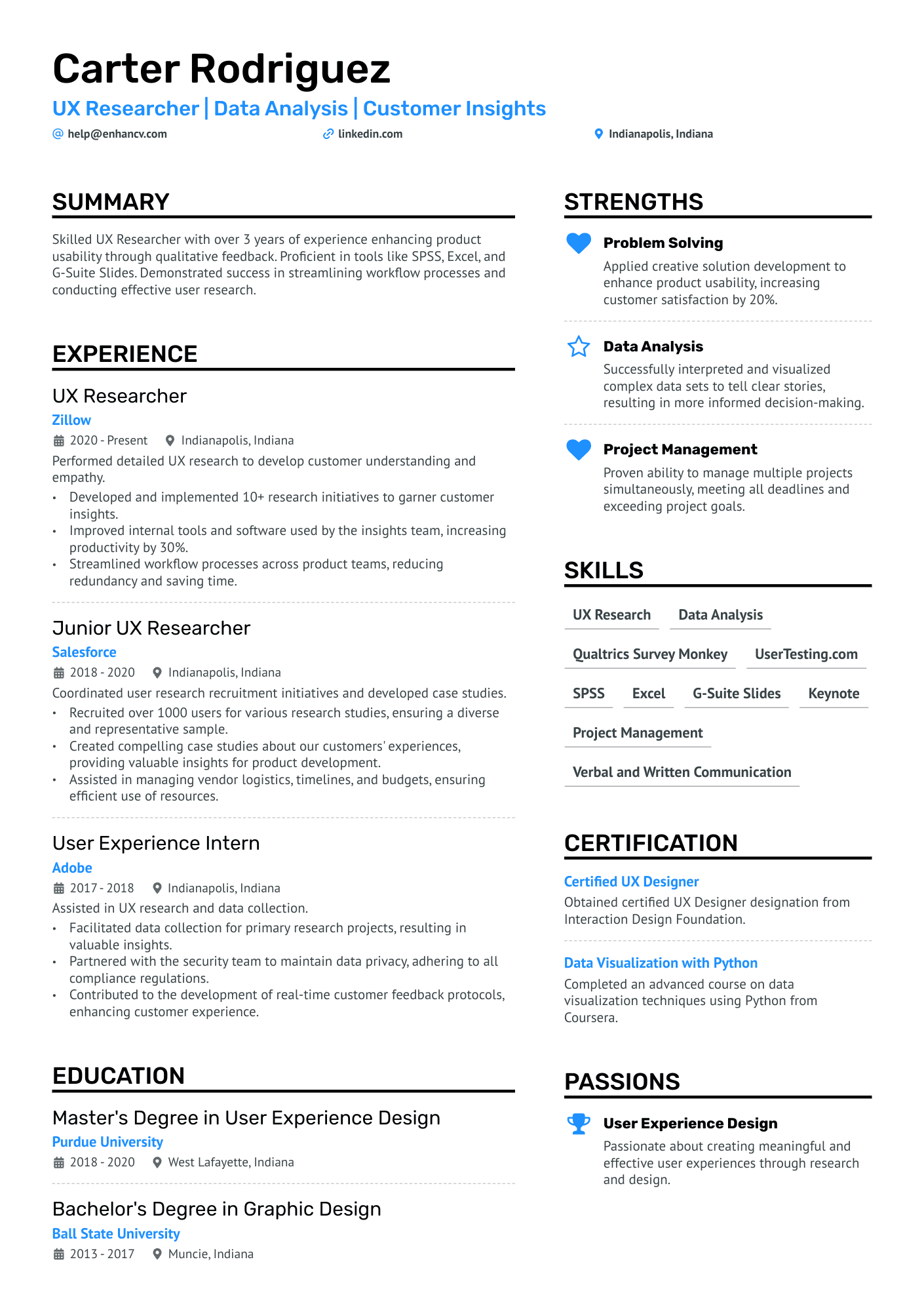
UX Researcher
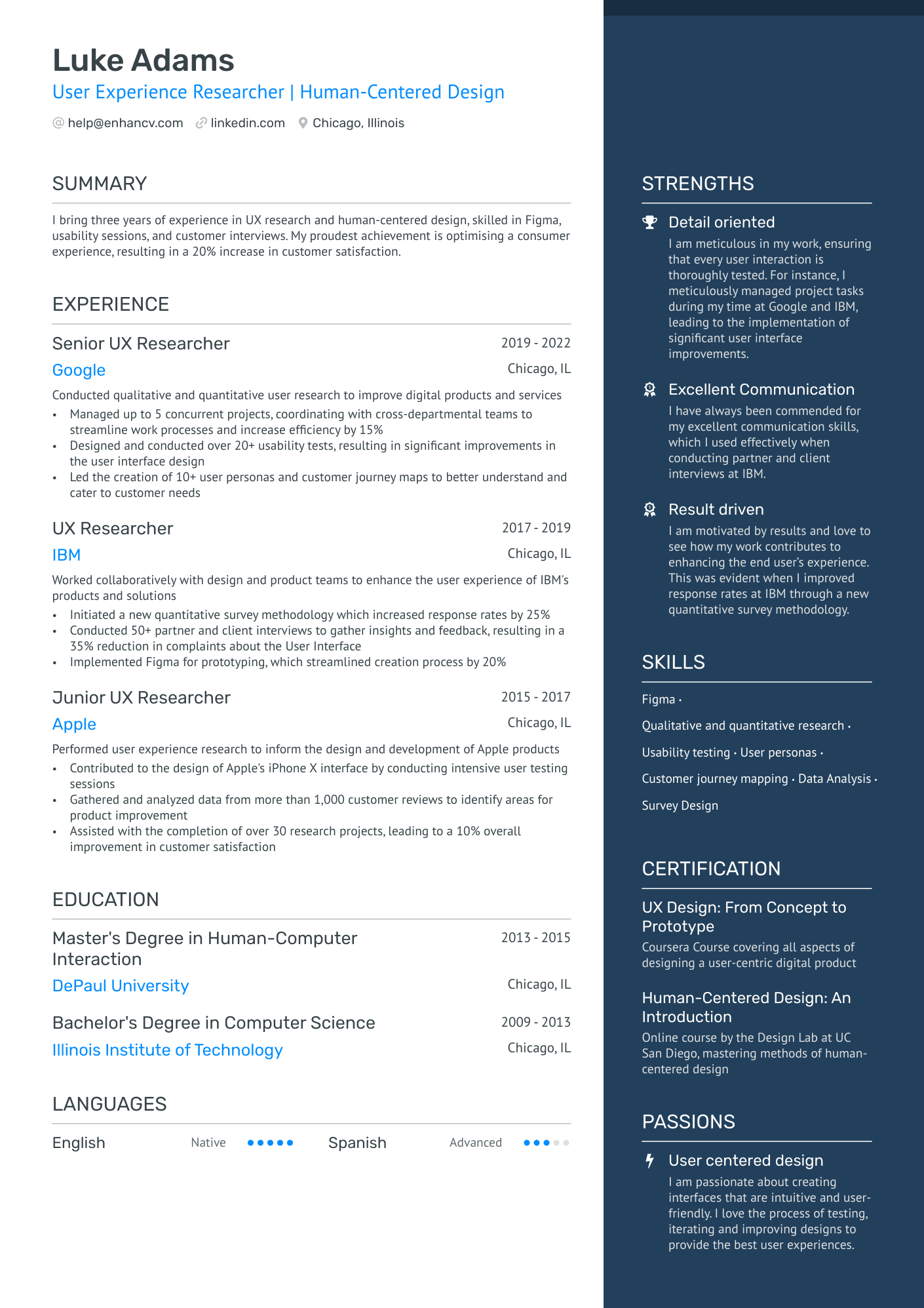
User Researcher
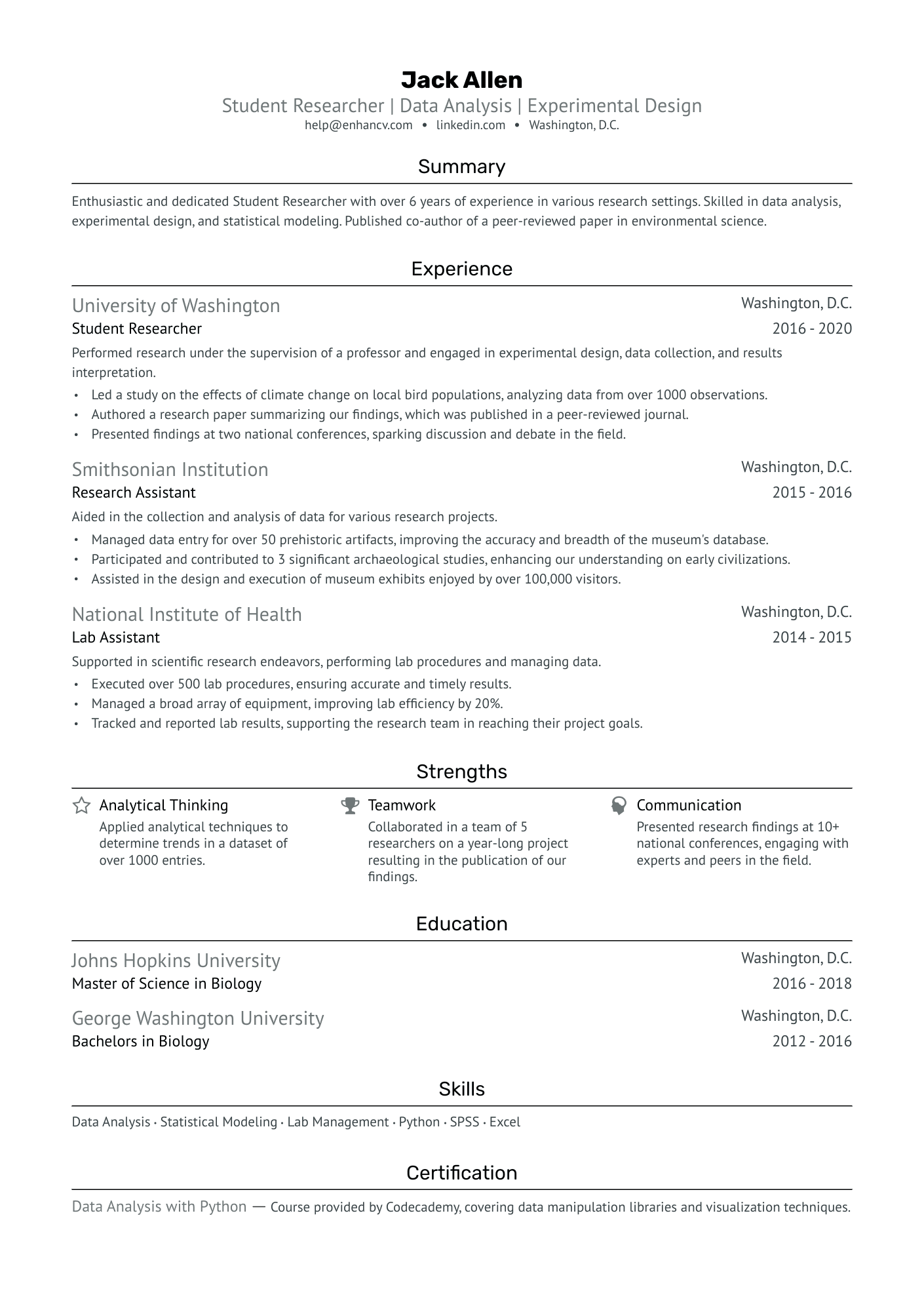
Student Researcher
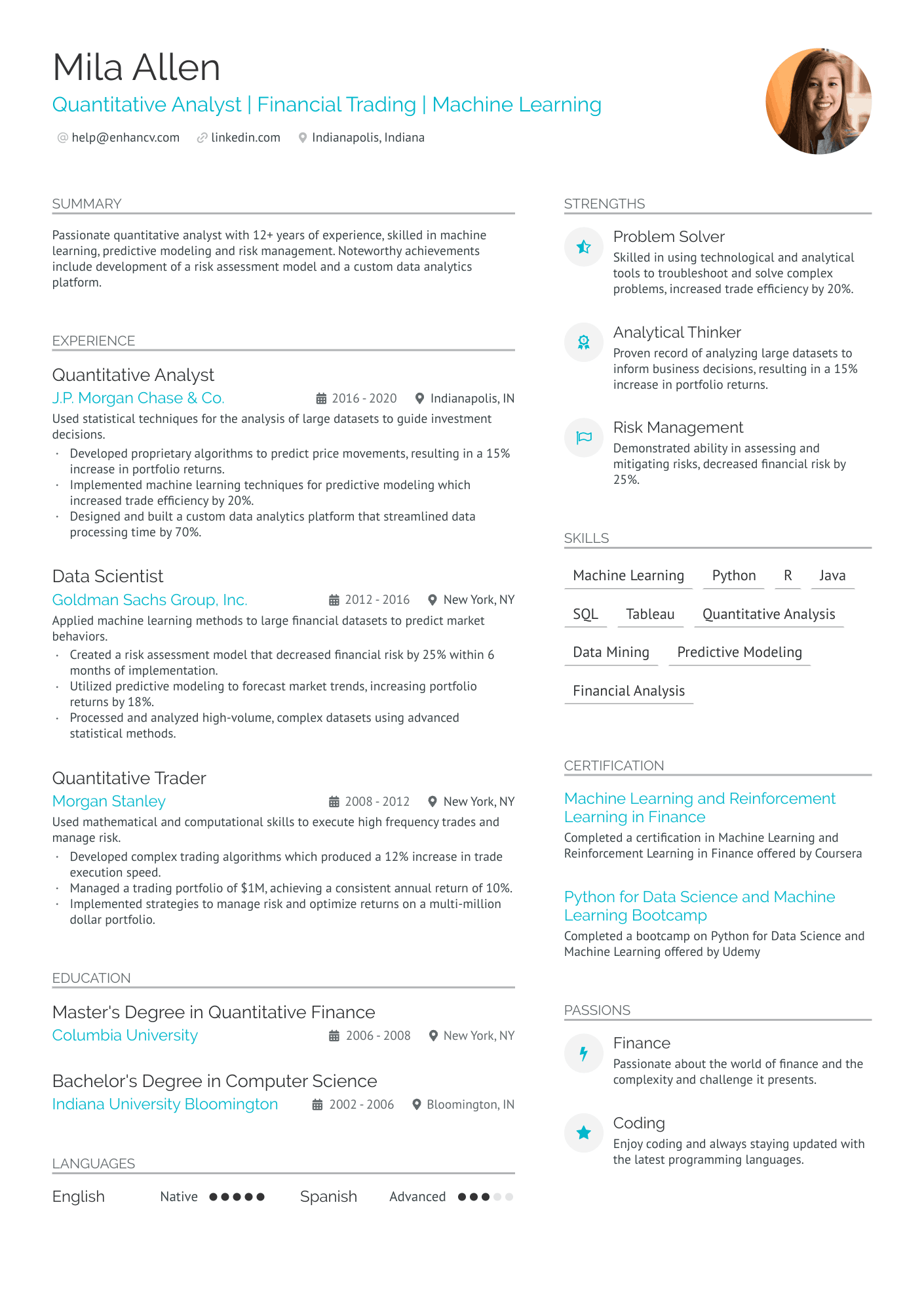
Quantitative Researcher
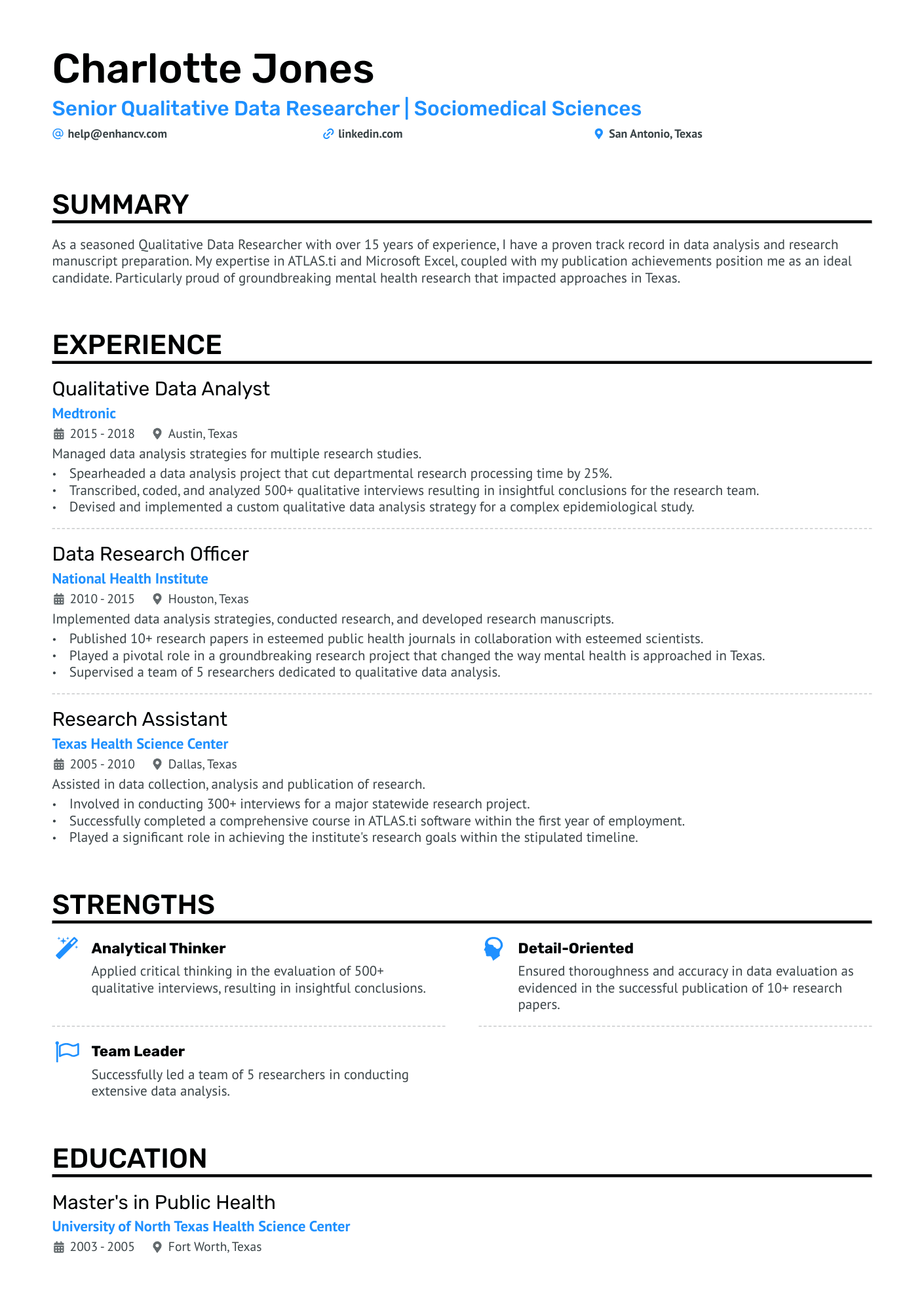
Qualitative Researcher
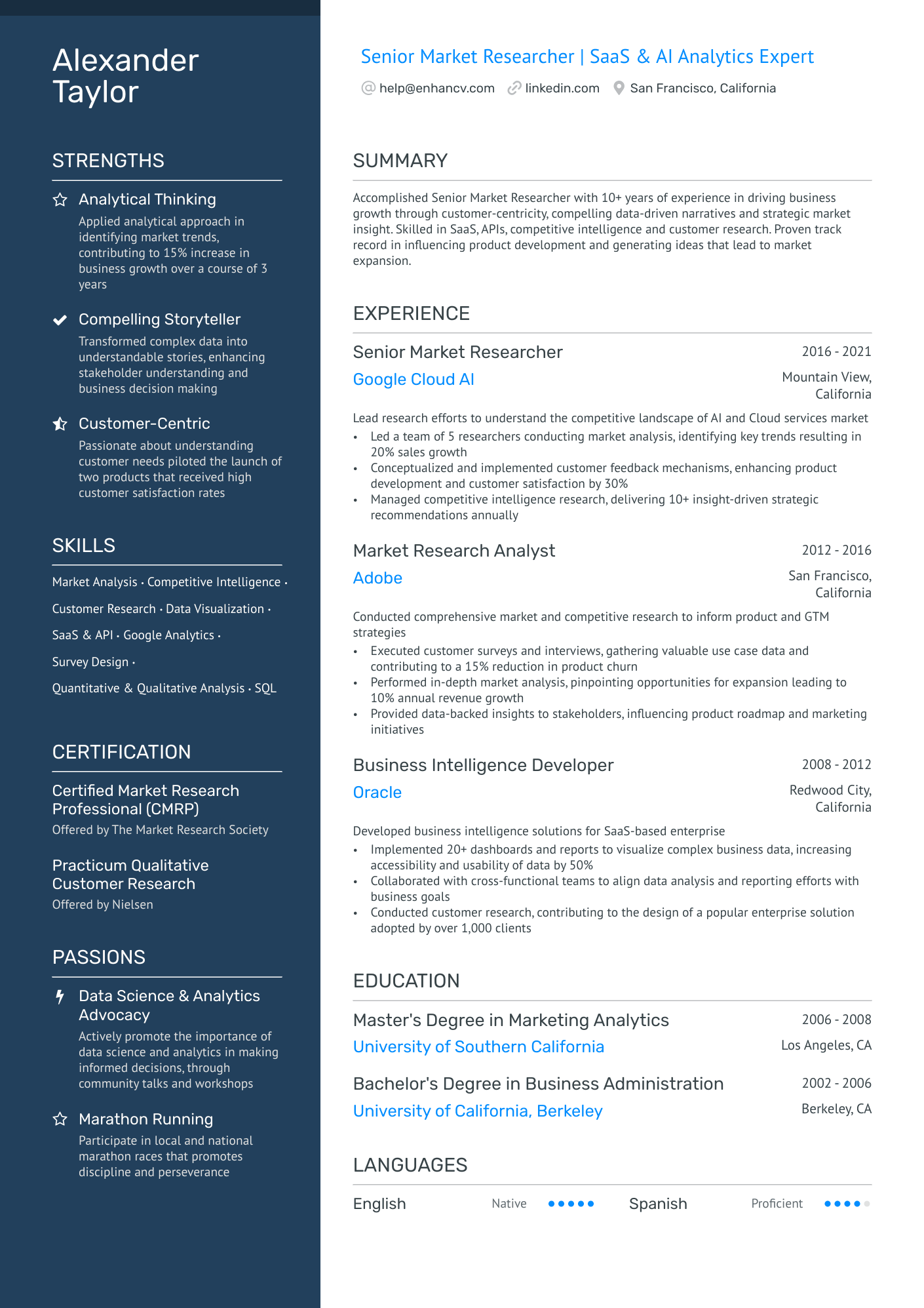
Market Researcher
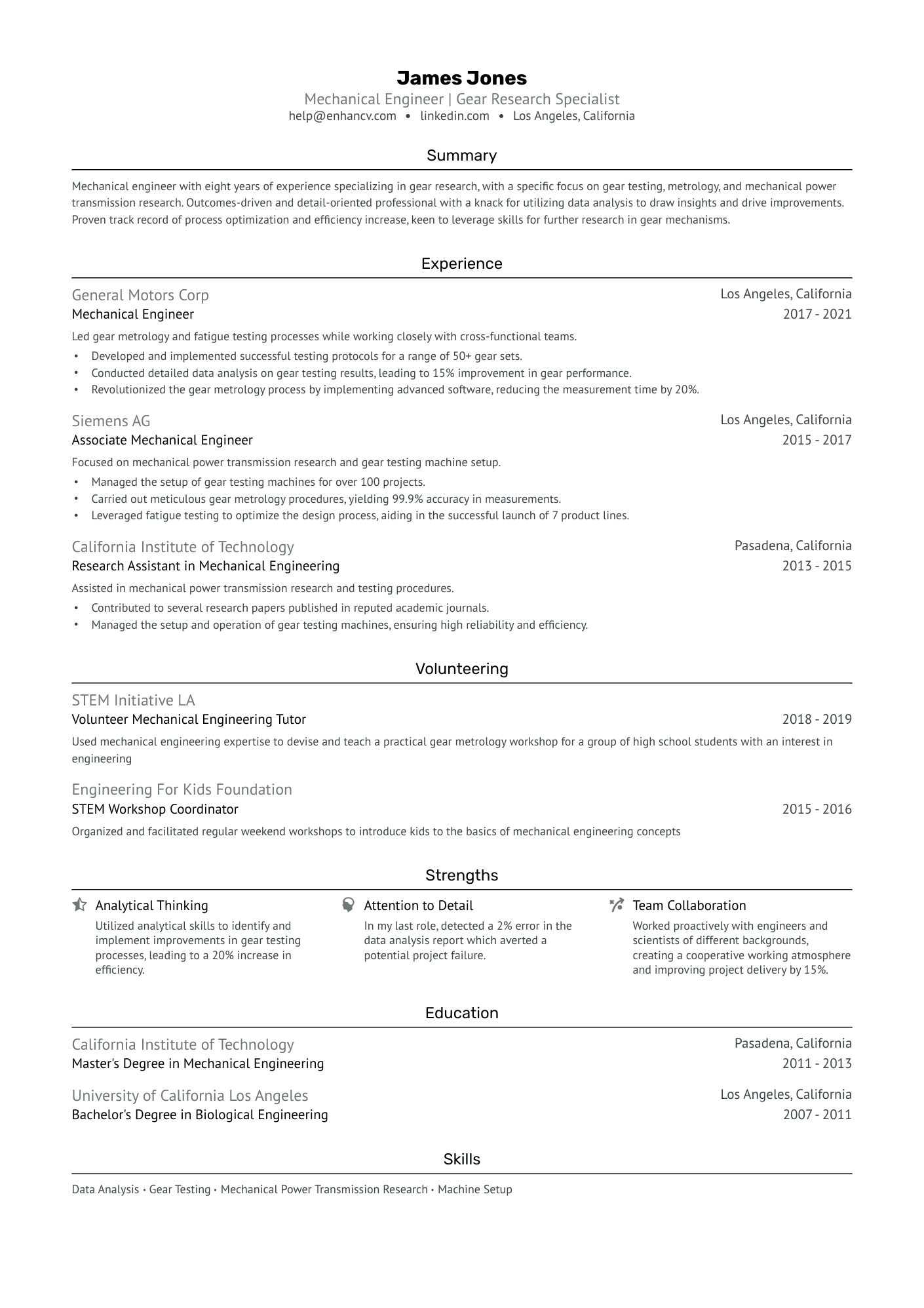
Undergraduate Researcher
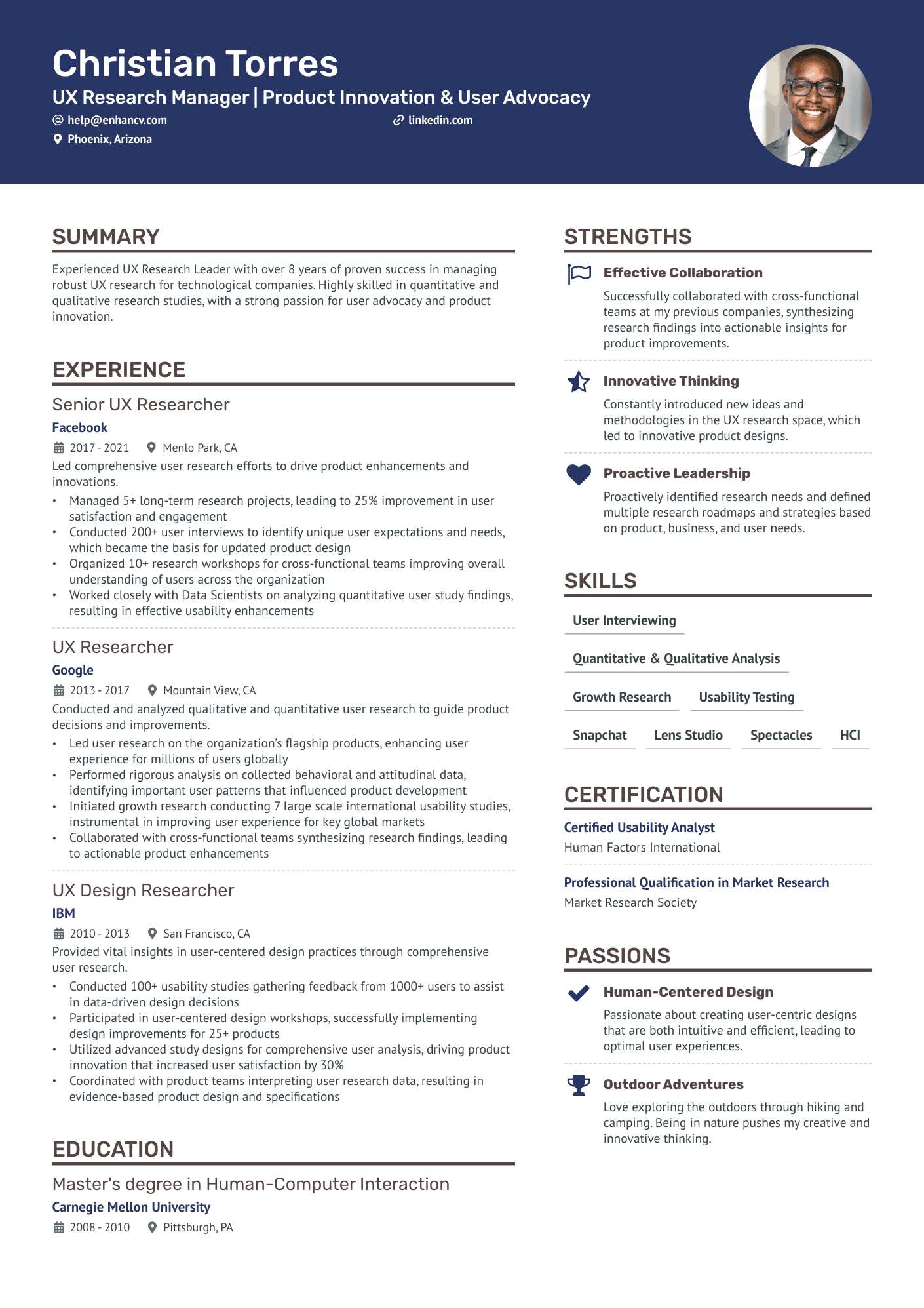
Product Researcher
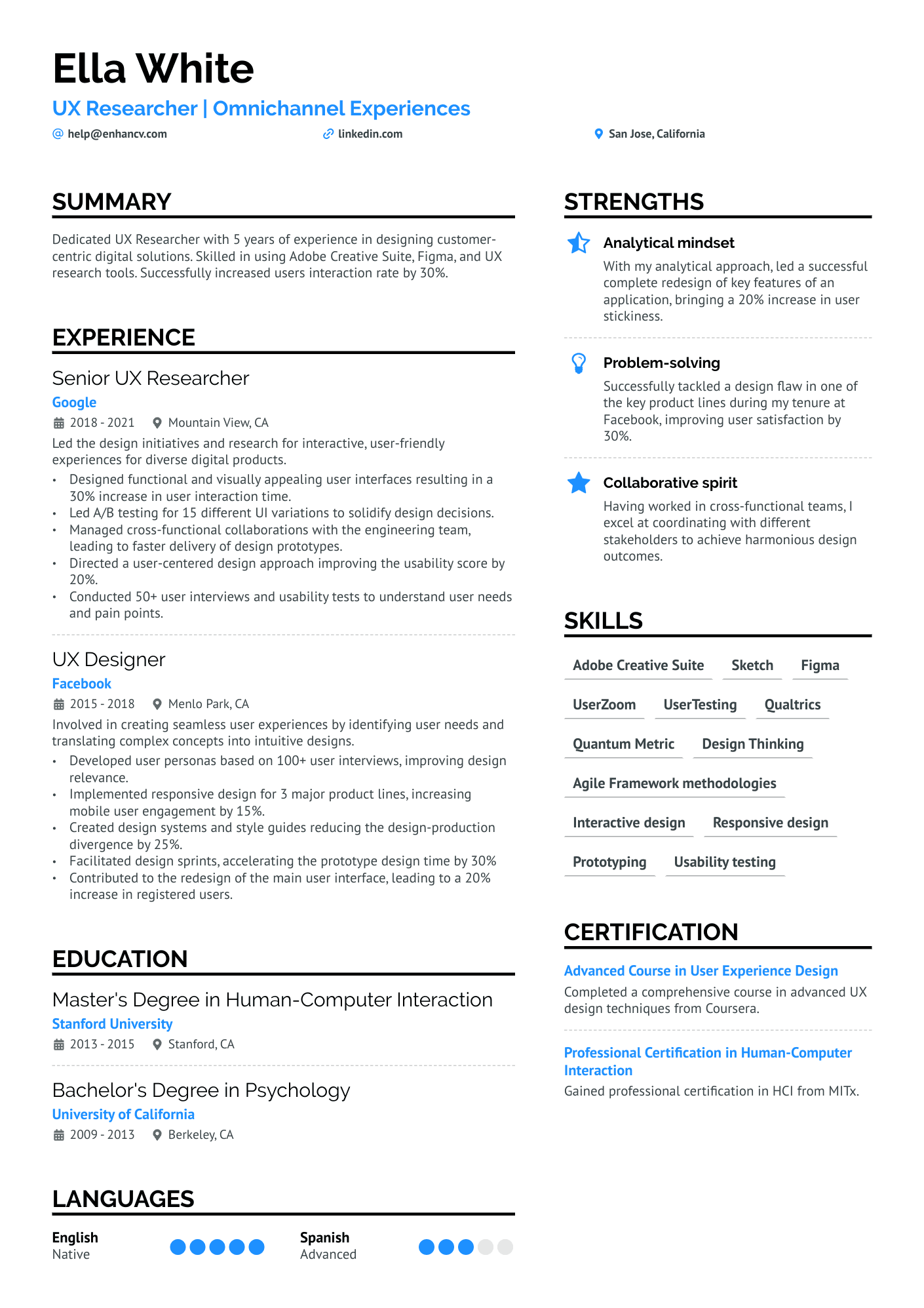
Psychology Researcher
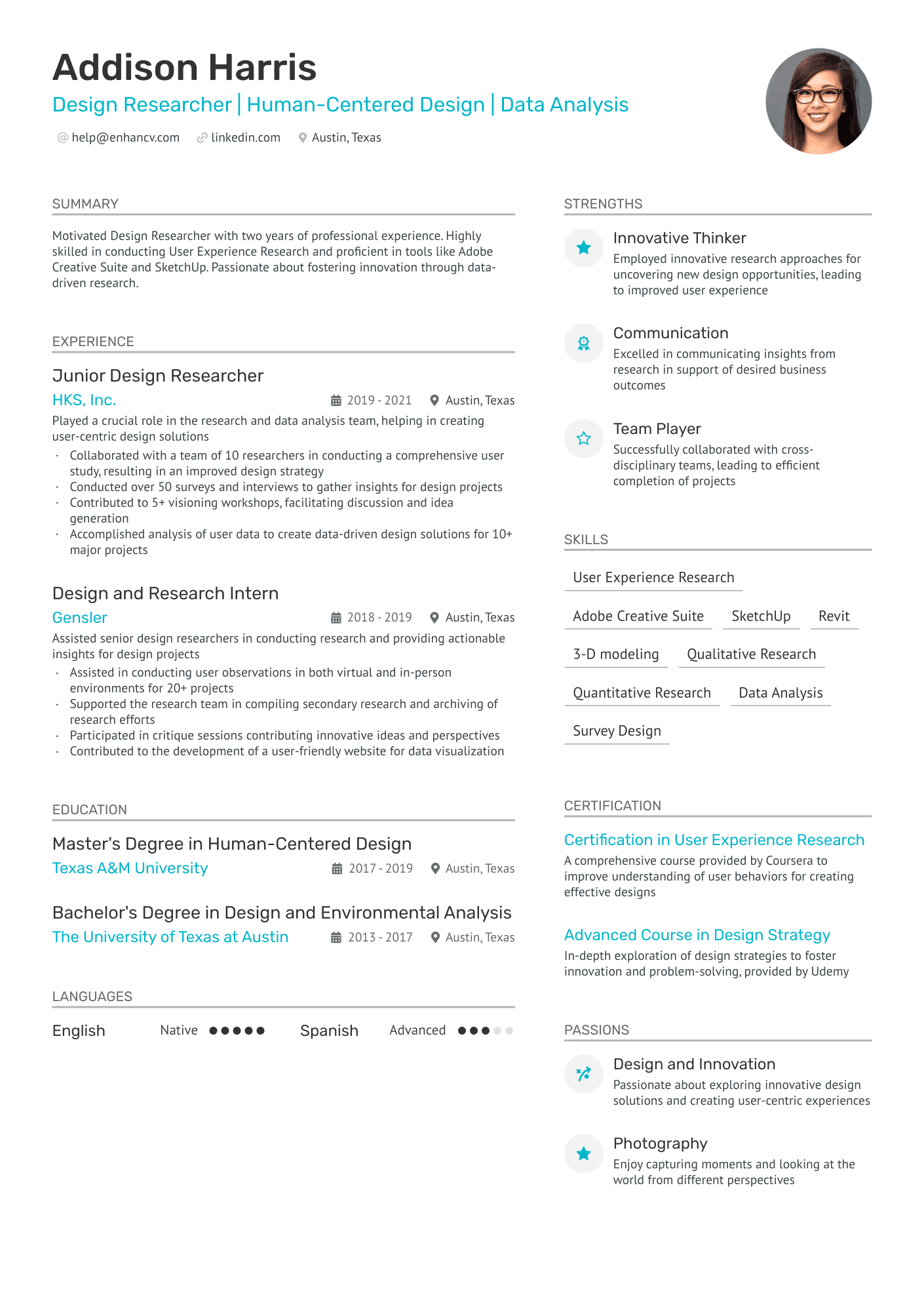
Design Researcher
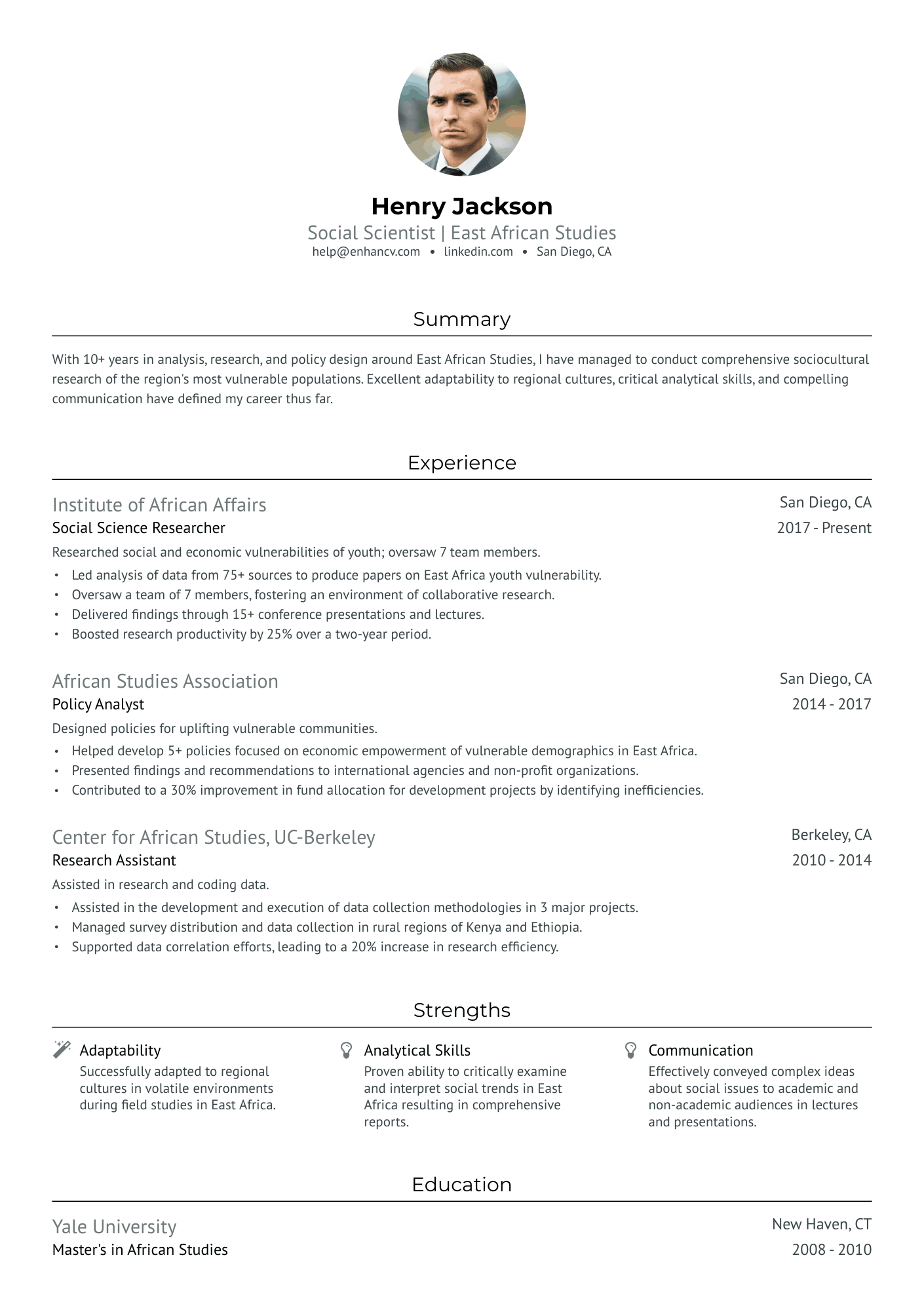
Lab Researcher
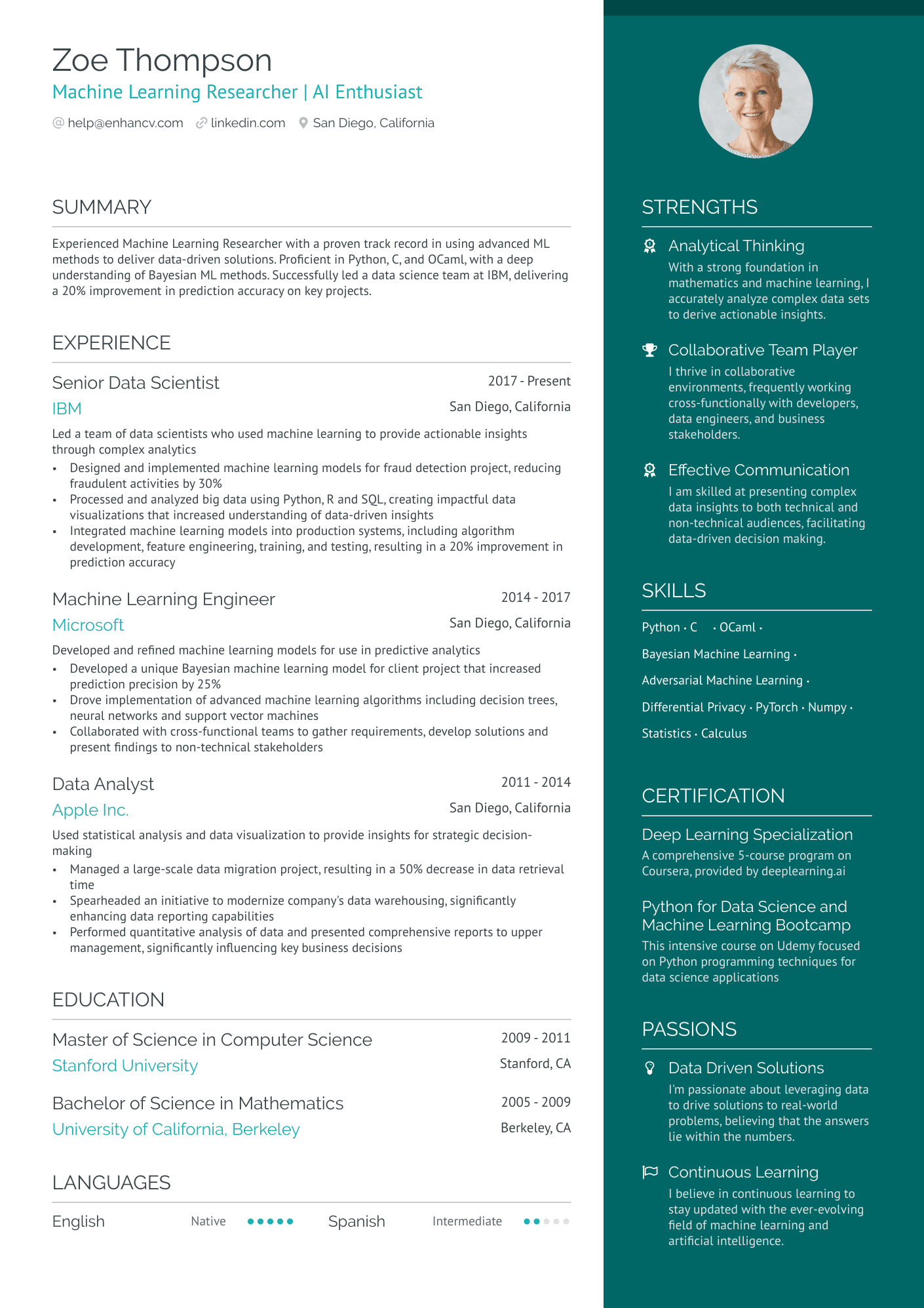
Machine Learning Researcher
Resume guide.
Resume Format Tips
Resume Experience
Skills on Resume
Education & Certifications
Resume Summary Tips
Additional Resume Sections
Key Takeaways

As a researcher, you may struggle with translating your extensive project experience into a concise format that appeals to a broad range of employers. Our guide will provide you with tailored strategies to effectively distill your research accomplishments into an impactful resume that resonates across industries.
- Utilize real-life examples to refine your researcher resume;
- Effectively write the experience section of your researcher resume, even if you have minimal or no professional experience;
- Incorporate the industry's top 10 essential skills throughout your resume;
- Include your education and certifications to highlight your specific expertise.
If the researcher resume isn't the right one for you, take a look at other related guides we have:
- Lab Manager Resume Example
- Lab Technician Resume Example
- Scientist Resume Example
- Chemist Resume Example
- Research Assistant Resume Example
- Lab Assistant Resume Example
- Research Director Resume Example
- Radiologic Technologist Resume Example
- Research Manager Resume Example
- Research Associate Resume Example
Simple guide to your researcher resume format and layout
- professional experience - use the reverse-chronological resume format;
- skills and achievements - via the functional skill-based resume format;
- both experience and skills - with a hybrid resume format .
What is more, keep in mind that your resume may be initially assessed by the ATS (Applicant Tracker System) (or the software used by companies in the hiring process). The researcher resumes that suit the ATS:
- have a header that includes either a role keyword or the job you're applying for;
- should be no longer than two pages;
- be submitted as PDF, unless specified otherwise.
Upload & Check Your Resume
Drop your resume here or choose a file . PDF & DOCX only. Max 2MB file size.
If you happen to have some basic certificates, don't invest too much of your researcher resume real estate in them. Instead, list them within the skills section or as part of your relevant experience. This way you'd ensure you meet all job requirements while dedicating your certificates to only the most in-demand certification across the industry.
The five (plus) definite sections your resume for a researcher job should include are:
- Header with your headline, contact details, and/or a preview of your work
- Summary (or objective) to pinpoint how your success aligns with the role
- Experience with bullets of your most relevant achievements in the field
- Skills to integrate vital job requirements (both technical and personal)
- Your further dedication to the field, showcased via relevant higher education and/or certifications
What recruiters want to see on your resume:
- Publishing Record: Evidence of publications in reputable journals or conferences relevant to the field.
- Research Experience: Detailed description of past research projects, roles, and contributions.
- Grant Writing Skills: Demonstrated success in securing research funding from grants, fellowships, or scholarships.
- Technical Expertise: Proficiency with tools and methodologies specific to the research area, like statistical analysis software, lab techniques, or data analysis programs.
- Collaboration and Communication: Examples of working effectively within interdisciplinary research teams and communicating complex research findings to diverse audiences.
Creating your researcher resume experience to catch recruiters' attention
Remember that for the researcher role, hiring managers are looking to see how your expertise aligns with their requirements. Here's where your resume experience section can help out. Make sure you:
- Include mainly roles that are relevant to the researcher job you're applying for;
- Don't go too far back in your experience - recruiters will only care what you did a decade ago if it's really important for the researcher role;
- Each bullet you include should say what you did, followed by the skills you used and the actual end result of your efforts;
- Quantify each of your achievements with numbers and possibly the overall effect it had on the organization;
- Highlight transferrable skills - or personal skills you've attained thanks to past jobs - that could be applicable within your potential workplace. This would showcase your unique value as a professional.
Formatting the experience section of your resume doesn't have to be an over-the-top deep dive into your whole career. Follow the researcher resume examples below to see how industry-leading professionals are presenting their experience:
- Designed and executed a comprehensive experimental study on the effects of new agricultural chemicals, increasing crop yields by 20% over a two-year period.
- Authored and co-authored 6 peer-reviewed journal articles in the field of synthetic biology, enhancing the company's academic presence and fostering collaborative opportunities.
- Mentored a team of junior researchers and interns, improving team productivity by 30% and helping to establish a robust research pipeline.
- Implemented new data collection protocols for patient trials, which improved data accuracy by 25% and ensured regulatory compliance.
- Coordinated with cross-functional teams to manage over 15 multi-center clinical trials, ensuring that deadlines were met and budgets were maintained.
- Presented findings at 3 international conferences, significantly raising the profile of the research programs and attracting future funding.
- Led the research and prototype development for a new medical device, which subsequently received FDA approval and led to a 150% increase in departmental revenue.
- Coordinated with a team of scientists to integrate artificial intelligence in the device's diagnostic process, improving prediction accuracy by 35%.
- Managed the intellectual property process for developed technologies, resulting in the granting of 5 patents and protecting the company's assets.
- Analyzed consumer behavior data and trends to inform the company's marketing strategies, contributing to a 40% increase in market share.
- Developed and administered over 200 surveys and focus groups to gather actionable customer insights, directly influencing product development.
- Worked directly with the sales team to refine target demographics, which led to more effective ad spend and a 25% increase in conversion rates.
- Directed a groundbreaking research initiative on renewable energy that secured $2M in grants from government and private sectors.
- Managed collaborations with industry partners to test and refine prototype solar panels, achieving a 50% increase in efficiency over existing models.
- Organized and chaired a successful international symposium on sustainable energy, fostering partnerships that led to further R&D investments.
- Led the development of a novel gene-editing platform, which resulted in a 200% increase in experiment throughput and reduced costs by 40%.
- Collaborated with pharmaceutical companies to leverage the platform for drug development, accelerating the timeline from discovery to preclinical trials.
- Managed the submission of regulatory documents for new research protocols, ensuring full compliance with all federal and state regulations.
- Processed and analyzed big data sets using advanced analytics tools, uncovering patterns that led to a 20% improvement in operational efficiency.
- Developed custom scripts and algorithms to automate data collection processes, saving the company an average of 250 man-hours per month.
- Designed an interactive dashboard that provided real-time insights into market trends, which became a key decision-making tool for the executive team.
- Monitored patient enrollment and data integrity for over 10 international clinical trials, ensuring adherence to study protocols and Good Clinical Practice guidelines.
- Provided key contributions to the successful launch of a Phase III trial, which saw a 95% retention rate of study participants due to enhanced engagement strategies.
- Developed training materials and conducted workshops for new clinical research coordinators, greatly improving the effectiveness and compliance of the research team.
The following content includes information from "O*NET OnLine" by the U.S. Department of Labor, Employment and Training Administration (USDOL/ETA). Used under the CC BY 4.0 license. The data represents the top responsibilities present on the task lists for researcher professionals.
Top Responsibilities for Researcher:
- Address the relationships of quantities, magnitudes, and forms through the use of numbers and symbols.
- Disseminate research by writing reports, publishing papers, or presenting at professional conferences.
- Maintain knowledge in the field by reading professional journals, talking with other mathematicians, and attending professional conferences.
- Apply mathematical theories and techniques to the solution of practical problems in business, engineering, the sciences, or other fields.
- Conduct research to extend mathematical knowledge in traditional areas, such as algebra, geometry, probability, and logic.
- Develop mathematical or statistical models of phenomena to be used for analysis or for computational simulation.
- Perform computations and apply methods of numerical analysis to data.
- Assemble sets of assumptions, and explore the consequences of each set.
- Develop new principles and new relationships between existing mathematical principles to advance mathematical science.
- Develop computational methods for solving problems that occur in areas of science and engineering or that come from applications in business or industry.
Quantifying impact on your resume
- Include the number of publications you've authored to demonstrate the depth and breadth of your research experience.
- List the amount of research funds you've secured, as it shows your capability to attract significant financial resources for your work.
- State the number of experiments or studies you've conducted to quantify your hands-on experience in your field.
- Mention the number of citations your work has received to reflect its influence and acceptance in the research community.
- Highlight the size of the research teams you've led or participated in to show your collaborative and leadership skills.
- Detail the number of conferences you've presented at to exhibit your ability to communicate your findings to a professional audience.
- Provide the percentage by which your findings have improved a process or technique within your field to illustrate the practical impact of your research.
- Specify the number of patents you hold, if applicable, to demonstrate innovation and potential for commercial application of your work.
Action verbs for your researcher resume

Four quick steps for candidates with no resume experience
Those with less or no relevant experience could also make a good impression on recruiters by:
- Taking the time to actually understand what matters most to the role and featuring this within key sections of their resume
- Investing resume space into defining what makes them a valuable candidate with transferrable skills and personality
- Using the resume objective to showcase their personal vision for growth within the company
- Heavily featuring their technical alignment with relevant certifications, education, and skills.
Remember that your resume is about aligning your profile to that of the ideal candidate.
The more prominently you can demonstrate how you answer job requirements, the more likely you'd be called in for an interview.
Recommended reads:
- How To Include Your Relevant Coursework On A Resume
- How to List Continuing Education on Your Resume
The more trusted the organization you've attained your certificate (or degree) from, the more credible your skill set would be.
Balancing hard and soft skills in your researcher resume
Recruiters indeed pay close attention to the specific hard and soft skills candidates possess. Hard skills refer to technical abilities or your proficiency in technologies, while soft skills are the personal attributes and qualities developed over your lifetime.
If you're unsure about effectively quantifying these skills on your resume, follow our step-by-step guide. It's crucial to first understand the key job requirements for the role. Doing so enables you to accurately list your:
- Hard skills in sections like skills, education, and certifications. Your technical expertise is straightforward to quantify. Most organizations find it sufficient to mention the certificates you've earned, along with your proficiency level.
- Soft skills within your experience, achievements, strengths, etc. Defining interpersonal communication traits in your resume can be challenging. Focus on showcasing the accomplishments you've achieved through these skills.
Remember, when tailoring your researcher resume, ensure that the skills you list match exactly with those in the job requirements. For instance, if the job listing specifies "Microsoft Word," include this exact term rather than just "Word" or "MSO."
Top skills for your researcher resume:
Statistical Analysis Software (e.g., SPSS, R, SAS)
Data Visualization Tools (e.g., Tableau, Power BI)
Qualitative Analysis Tools (e.g., NVivo, MAXQDA)
Survey Design and Analysis
Research Methodologies (e.g., qualitative, quantitative, mixed methods)
Database Management Systems (e.g., SQL, Access)
Reference Management Software (e.g., EndNote, Mendeley)
Web Scraping Tools (e.g., Beautiful Soup, Scrapy)
Programming Languages (e.g., Python, MATLAB)
Literature Review Techniques
Critical Thinking
Attention to Detail
Communication Skills
Problem-Solving
Time Management
Collaboration
Adaptability
Organizational Skills
Ethical Judgment
Next, you will find information on the top technologies for researcher professonals from "O*NET OnLine" by the U.S. Department of Labor, Employment and Training Administration (USDOL/ETA). Used under the CC BY 4.0 license.
Top technologies for Researcher’s resume:
- IBM SPSS Statistics
- The MathWorks MATLAB
- Microsoft PowerPoint
List your educational qualifications and certifications in reverse chronological order.
The importance of your certifications and education on your researcher resume
Pay attention to the resume education section . It can offer clues about your skills and experiences that align with the job.
- List only tertiary education details, including the institution and dates.
- Mention your expected graduation date if you're currently studying.
- Exclude degrees unrelated to the job or field.
- Describe your education if it allows you to highlight your achievements further.
Your professional qualifications: certificates and education play a crucial role in your researcher application. They showcase your dedication to gaining the best expertise and know-how in the field. Include any diplomas and certificates that are:
- Listed within the job requirements or could make your application stand out
- Niche to your industry and require plenty of effort to obtain
- Helping you prepare for professional growth with forward-facing know-how
- Relevant to the researcher job - make sure to include the name of the certificate, institution you've obtained it at, and dates
Both your certificates and education section need to add further value to your application. That's why we've dedicated this next list just for you - check out some of the most popular researcher certificates to include on your resume:
The top 5 certifications for your researcher resume:
- Project Management Professional (PMP) - Project Management Institute
- Certified Research Administrator (CRA) - Research Administrators Certification Council
- Institutional Review Board Professional (CIP) - Public Responsibility in Medicine and Research
- Certified Clinical Research Professional (CCRP) - Society of Clinical Research Associates
- Data Analysis & Statistics Certificate (DASC) - Various Institutions
The content below includes information from "O*NET OnLine" by the U.S. Department of Labor, Employment and Training Administration (USDOL/ETA). Used under the CC BY 4.0 license. The data represents the top associations for researcher professionals.
Top US associations for a Researcher professional
- American Mathematical Society
- Society of Actuaries
- American Mathematical Association of Two-Year Colleges
- American Physical Society
- American Statistical Association
Highlight any significant extracurricular activities that demonstrate valuable skills or leadership.
When Should You Include Your High School on Your Resume?
- How To List Certifications On A Resume (Examples Included)
Researcher resume summary or objective? The best choice is based on your experience
If you're wondering about the relevancy of the resume summary or the resume objective to your researcher application - here's the truth.
The summary and objective provide recruiters with your expertise and accomplishments at a glance, within an up-to-five-sentence structure.
The difference is that the:
- Resume objective is also more focused on emphasizing your career goals. The objective is the perfect fit for (potentially more junior) candidates who'd like to balance their relevant experience with their career goals.
- Resume summary can provide you with space to also detail the unique value of what it's like to work with you. Researcher candidates who have many noteworthy accomplishments start from the get-go with their summary.
Ensure that either type of resume introduction presents your researcher expertise in the best light and aligns it with the job advert.
The more details you can provide with numbers, the more compelling your resume summary or objective will be.
Real-world researcher candidates follow these frameworks in writing their resume summaries and objectives.
The end results are usually as such:
Resume summaries for a researcher job
- With a decade of profound experience in molecular biology, an extensive publication record, and a Ph.D. from MIT, the candidate is adept in genomics, proteomics, and bioinformatics. Awarded with the Young Scientist Award, they have led teams in groundbreaking cancer research, yielding patents and significant advancements in targeted therapy.
- A seasoned chemist with 15 years at GlaxoSmithKline specializing in pharmaceutical development, pivoting into biotechnology research with a strong desire to apply synthetic chemistry skills towards developing novel biologics. Recognized for innovation in small molecule synthesis, keen to contribute to interdisciplinary approaches in disease treatment.
- Former aerospace engineer with 12 years' tenure at NASA seeking to transition into climate research. Armed with robust analytical skills, a deep understanding of complex systems, and a master’s degree in environmental engineering, aiming to utilize simulation modeling to address pressing environmental challenges and climate change.
- After years of developing market forecasts and data models for economic research at a leading think tank, the candidate is eager to transfer their refined quantitative analysis skills into computational neuroscience research. With a strong grasp of machine learning and predictive analytics, they are ready to contribute to elucidating neural network functionalities.
- Graduating magna cum laude with a B.S. in biology, the applicant is enthusiastic about beginning a research career in immunology. Committed to lifelong learning and making impactful contributions, they are determined to leverage their strong foundation in cell biology and genetics to aid in developing innovative immunotherapies.
- As an ambitious recent graduate with a Master's in Computer Science and a passion for algorithm design, I am eager to delve into the world of bioinformatics research. With a zest for problem-solving and a commitment to advancing healthcare through technology, I aim to contribute to projects focused on genetic data analysis and personalized medicine.
Average salary info by state in the US for Researcher professionals
Local salary info for Researcher.” Source: My Next Move, National Center for O*NET Development. Accessed 10/15/2024
Showcasing your personality with these four researcher resume sections
Enhance your researcher expertise with additional resume sections that spotlight both your professional skills and personal traits. Choose options that not only present you in a professional light but also reveal why colleagues enjoy working with you:
- My time - a pie chart infographic detailing your daily personal and professional priorities, showcasing a blend of hard and soft skills;
- Hobbies and interests - share your engagement in sports, fandoms, or other interests, whether in your local community or during personal time;
- Quotes - what motivates and inspires you as a professional;
- Books - indicating your reading and comprehension skills, a definite plus for employers, particularly when your reading interests align with your professional field.
Key takeaways
At the end of our guide, we'd like to remind you to:
- Invest in a simple, modern resume design that is ATS friendly and keeps your experience organized and legible;
- Avoid just listing your responsibilities in your experience section, but rather focus on quantifiable achievements;
- Always select resume sections that are relevant to the role and can answer job requirements. Sometimes your volunteering experience could bring more value than irrelevant work experience;
- Balance your technical background with your personality traits across various sections of your resume to hint at how much time employers would have to invest in training you and if your profile would be a good cultural fit to the organization;
- Include your academic background (in the form of your relevant higher education degrees and certifications) to show recruiters that you have the technical basics of the industry covered.
Researcher resume examples
Explore additional researcher resume samples and guides and see what works for your level of experience or role.

Looking to build your own Researcher resume?
- Resume Examples
Bulgaria: a CV To Make You Proud
Get enhancv pro 20% off, how to write a resignation email [with 22 examples], how far back to go on your resume, how to showcase your minor on linkedin.
- Create Resume
- Terms of Service
- Privacy Policy
- Cookie Preferences
- Resume Templates
- Resume Builder
- Resume Summary Generator
- Resume Formats
- Resume Checker
- AI Resume Review
- Resume Skills
- How to Write a Resume
- Modern Resume Templates
- Simple Resume Templates
- Cover Letter Builder
- Cover Letter Examples
- Cover Letter Templates
- Cover Letter Formats
- How to Write a Cover Letter
- Resume Guides
- Cover Letter Guides
- Job Interview Guides
- Job Interview Questions
- Career Resources
- Meet our customers
- Career resources
- [email protected]
- English (UK)
- French (FR)
- German (DE)
- Spanish (ES)
- Swedish (SE)
Made with love by people who care.
© 2024 . All rights reserved.
Research Scientist CV Example
Cv guidance.
- CV Template
- How to Format
- Personal Statements
- Related CVs
CV Tips for Research Scientists
- Highlight Your Education and Specialization : Clearly state your degrees, the institutions you attended, and your areas of specialization. If you have a PhD or post-doctoral experience, place this information prominently in your CV.
- Detail Your Research Achievements : Quantify your impact with specific metrics, such as the number of projects led, grants won, or publications in high-impact journals.
- Customize Your CV to the Role : Align your CV content with the job's requirements, emphasizing relevant experiences and skills. If the role requires expertise in a specific research method or technology, make sure this is clearly stated in your CV.
- Specify Your Technical Skills : List your proficiency in laboratory techniques, scientific software, or equipment relevant to your field. Also, mention any experience with data analysis or statistical tools.
- Showcase Collaboration and Leadership : Highlight your experience in leading research teams, collaborating on multi-disciplinary projects, or mentoring junior researchers. This demonstrates your ability to contribute to a team and lead scientific projects.
The Smarter, Faster Way to Write Your CV
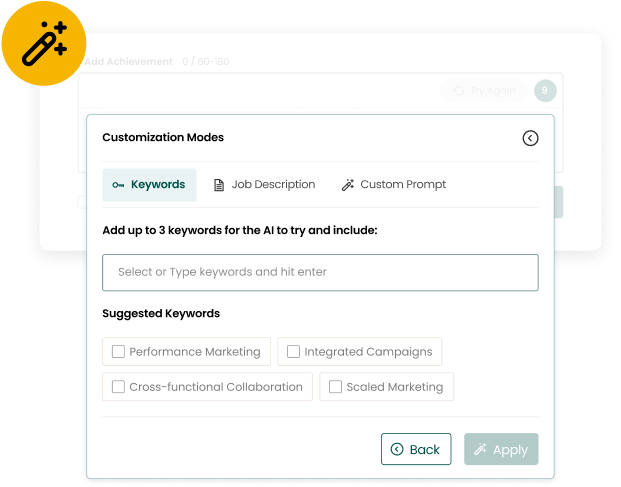
- Directed a team of 10 researchers in a groundbreaking study on gene therapy, resulting in 3 published papers in high-impact journals and a 20% increase in departmental funding.
- Implemented a new data analysis protocol using advanced statistical software, improving the accuracy of research findings by 30% and accelerating the data processing time by 40%.
- Developed a novel research methodology that reduced the time to results by 25%, leading to faster publication and increased recognition within the scientific community.
- Coordinated a cross-functional team of scientists and engineers in the development of a new biomedical device, which is now being used in over 50 hospitals nationwide.
- Secured a $500,000 grant for a 3-year research project on neurodegenerative diseases, contributing to the advancement of knowledge in the field.
- Presented research findings at 5 international conferences, enhancing the visibility of the organization and fostering collaborations with other research institutions.
- Conducted a comprehensive study on the effects of environmental factors on cell growth, leading to a better understanding of cell behavior and contributing to 2 peer-reviewed publications.
- Collaborated with a multidisciplinary team to develop a new laboratory protocol, improving lab safety and efficiency by 15%.
- Initiated a mentoring program for junior researchers, improving their technical skills and increasing their publication rate by 20%.
- Team Leadership and Management
- Advanced Data Analysis
- Research Methodology Development
- Cross-functional Collaboration
- Grant Writing and Fundraising
- Public Speaking and Presentation
- Comprehensive Scientific Research
- Protocol Development and Implementation
- Mentorship and Training
- Project Coordination and Execution
Research Scientist CV Template
- Conducted [type of research, e.g., clinical trials, data analysis] in collaboration with [teams/departments], leading to [result, e.g., new scientific insights, patent filings], demonstrating strong [soft skill, e.g., teamwork, leadership].
- Managed [research function, e.g., lab operations, project timelines], optimizing [process or task, e.g., data collection, experiment setup] to enhance [operational outcome, e.g., research efficiency, data accuracy].
- Implemented [system or process improvement, e.g., new lab equipment, revised data analysis methods], resulting in [quantifiable benefit, e.g., 20% time savings, improved data quality].
- Played a pivotal role in [project or initiative, e.g., drug development, environmental research], which led to [measurable impact, e.g., publication in a top-tier journal, grant funding].
- Performed [type of analysis, e.g., statistical analysis, genetic sequencing], using [analytical tools/methods] to inform [decision-making/action, e.g., research direction, policy recommendations].
- Instrumental in [task or responsibility, e.g., lab safety protocols, mentoring junior researchers], ensuring [quality or standard, e.g., compliance, professional development] across all research activities.
- Major: Name of Major
- Minor: Name of Minor
100+ Free Resume Templates
How to format a research scientist cv, start with a compelling research objective, emphasize education and publications, detail relevant research experience, highlight technical skills and collaborations, personal statements for research scientists, research scientist personal statement examples, what makes a strong personal statement.
Compare Your CV to a Job Description

CV FAQs for Research Scientists
How long should research scientists make a cv, what's the best format for an research scientist cv, how does a research scientist cv differ from a resume, related cvs for research scientist.
Research Analyst CV
Research Assistant CV
Research Associate CV
Research Coordinator CV
Research Manager CV
Research Technician CV
Try our AI Resume Builder

IMAGES
VIDEO
COMMENTS
Learning how to write an effective CV for research can help you further your knowledge and contribute to academic research. In this article, we discuss what a CV for research is, how to write one, what to include and share a template and sample you can use when creating your own.
Learn how to write a graduate academic CV for research. See academic CV examples and grad school CV formatting tips.
There are a number of ways you can highlight research experience on your resume: In a dedicated section. In your work experience. In your education section. Listing research publications. In a projects section. In your skills section. In your resume summary. Let's take a look at each of these options in a little more depth.
Do you need a research scientist CV that helps you to build chemistry with recruiters? Then we have a solution! We can help you to create an application worthy of your white coat. Make the most of our top tips and research scientist CV example below to get you started. Contents. CV templates. Research Scientist CV example. CV templates.
Our guide will provide you with tailored strategies to effectively distill your research accomplishments into an impactful resume that resonates across industries. Ever curious about how to tailor your researcher resume for your ideal job?
A good CV showcases your skills and your academic and professional achievements concisely and effectively. It’s well-organized and easy to read while accurately representing your highest accomplishments.
A CV is generally used when applying for academic, scientific, or certain government research positions. The CV includes a broader range of topic areas including an extensive list of academic engagements, publications, and presentations, including honors and awards. The goal of a CV is to highlight one’s academic accomplishments.
Your CV is a reflection of your scientific expertise, research accomplishments, and the unique contributions you can bring to a research team. It should effectively highlight your technical skills, scientific knowledge, and your ability to drive research projects to successful conclusions.
1. Use the Right Academic CV Template and Format. 2. Create a Standard Academic CV Header. 3. Optionally, Write a Research Objective or a Personal Profile on Your Academic CV. 4. Describe Your Education on the Academic CV. 5. List Your Professional Appointments. 6. Divide Your Publications into Proper Categories. 7.
Researcher Resume Examples. Need assistance writing your resume? Our Researcher resume examples are equipped with professionally written content to help you land your ideal job! Build a resume. 80. : 80. by LiveCareer Staff Writer •. Last Updated: August 14, 2024. Candidate experience level: 14 years. Candidate experience level: >1 year.